Australia
- February 2025 Australia Report
- November 2024 Australia Report
- August 2024 Australia Report
- May 2024 Australia Report
- February 2024 Australia Report
- July 2023 Australia Report
- April 2023 Australia Report
- January 2023 Australia Report
- November 2022 Australia Report
- August 2022 Australia Report
- May 2022 Australia Report
- February 2022 Australia Report
- November 2021 Australia Report
- August 2021 Australia Report
- May 2021 Australia Report
- February 2021 Australia Report
- October 2020 Australia Report
- July 2020 Australia report
- April 2020 Australia report
- November 2020 Country report
- September 2019 Country report
- News and Tools from Australia
- Applying Theory to Career Development in Schools
- Hope, Connections and more from Australia, December 2018
- Improving Career Outcomes for Migrants Seeking Work in Australia
- Working with Immigrants – A Personal Australian Perspective, October 2018
- Current Focus on Life Beyond School and University in Australia, April 2018
- Made in Australia, Usable across the Pacific
- Australia Country Report, May 2016
- Australian Government Changes Impact Career Services, March 2015
- CDAA: Inspiring Excellence in an Environment of Chaos, March 2015
Labour Force Survey data from Australian Bureau of Statistics December 2024:
Highlights:
Unemployment rate decreased to 4.0% (-0.1%) from the previous report and youth unemployment decreased to 9.0% (-0.5%).
Workforce participation rate decreased slightly to 67.1% (71.3% for men, 63.0% for women).
Full-time employment increased by 17,700 positions while part-time employment increased by 13,300. Part-time share of employment was 31.0% (+0.1%)
Underemployment rate decreased to 6.0% (-0.4%).
Internet Vacancy Index (IVI) from Jobs and Skills Australia, December 2024 data
Online job advertisements decreased by 2.5% (or 5,400 job advertisements) in September 2024 to stand at 214,600. This is still 25% increase since 2019 (pre-Covid).
Vacancy numbers continue at elevated levels, with around 25% more advertisements in the labour market presently than compared with the monthly average for 2019.
Research and Reports
Jobs and Skills Australia have identified 37 emerging roles in the Australian job market in the latest Emerging Roles report. These roles may be new to the Australian labour market, experiencing fast growth, or representing new specialisations within an existing occupation. The 37 emerging roles are grouped into four key themes: Net Zero, Health, Care and Medical, Data and Technologies, and Science and Engineering.
Australian Labour Market for Migrants October 2024 report, Jobs and Skills Australia
Strong and Responsive VET Pathways, 2019-2020 graduate outcomes, Jobs and Skills Australia
AHRI Quarterly Australian Work Outlook – December 2024, Australian Human Resource Institute
Better Together – The Jobs and Skills Report 2024, Jobs and Skills Australia
Regional Labour Market Indicator, Jobs and Skills Australia
Employment Projections, Jobs and Skills Australia
Australia’s Gender Equality Scorecard: November 2024, Workplace Gender Equality Agency
International Labour Market Update – November 2024, Jobs and Skills Australia
Faces of Unemployment, Australian Council of Social Service
Disability inclusion @ work 2024, Deloitte
The State of AI in Australian Human Resources, AHRI and QUT
LinkedIn Jobs on the Rise 2025: The 15 Fastest Growing Roles in Australia
VET Student Outcomes 2024, NCVER
Resources
Skills to Work Pathways: infographics and activities, myfuture
Neurodiversity employment kit, Victorian Public Service Commission
Your Career News, December 2024, Department of Employment and Workplace Relations
Your Career News, January 2025, Department of Employment and Workplace Relations
In the News
‘Horrifying’ trend: women are quitting jobs due to pressure from male partners, ANU Reporter, November 12, 2024
This community faces unemployment like no other, SBS Examines, November 11, 2024
Who’s more neurotic, dentists or engineers? Does it matter?, Sydney Morning Herald, November 9, 2024
I spoke to 100 Japanese seniors, and learnt the secret to a good retirement is a good working life, The Conversation, November 7, 2024
Albanese flags radical changes to student debt – with a 20% overall cut and drop in payment rates, The Conversation, November 3, 2024
What are the most in-demand skills for professionals?, Human Resources Director, October 31, 2024
‘Your life is the most important project you’ll ever work on’: An architect’s advice for building a purpose-led career, Women’s Agenda, October 30, 2024
Women are still being paid almost $30,000 a year less than men and the gap widens with age, The Conversation, November 20, 2024
Waiting for exam results can be awful. Our research shows how best to manage the stress, The Conversation, November 18, 2024
Is this employment data a sign we are nearing the end of the great resignation?, SBS News, November 17, 2024
Australia’s unemployment rate remained steady in October at 4.1pc, ABC News, November 14, 2024
Australians on income support payments for longer as entry-level jobs disappear, ABC News, December 9, 2024
8 tips to help you build your professional brand on LinkedIn, HR Media, December 6, 2024
Gender gap in maths and science in Australia among worst in the world, Women’s Agenda, December 5, 2024
Why are boys outperforming girls in maths?, The Conversation, December 5, 2024
‘Ebullient leadership’ can lift your workers out of the doldrums and increase productivity, The Conversation, December 3, 2024
‘I felt lost’: immigrant parents want more support to help their children go to uni, The Conversation, December 2, 2024
Green jobs growth and AI disruption are key themes for the workforce of 2025, ABC News, January 14, 2025
Which jobs will be most in demand in Australia by 2030?, Human Resources Director, January 9, 2025
5 tips to ace a job interview – including how to prepare for the question they’ll definitely ask, The Conversation, January 6, 2025
Wage theft now a crime in Australia, ABC PM, January 1, 2025
Work or play? The rise of online ‘kidfluencers’ is raising complex legal and ethical questions, The Conversation, December 24, 2024
International student numbers in Australia will be controlled by a new informal cap. Here’s how it will work, The Conversation, December 19, 2024
You’ve just got your Year 12 results. What do you do now?, The Conversation, December 16, 2024
Making Research Real: Putting Evidence to Work in Career Development Practices
Changing jobs is a big move but it’s worth considering if your workplace is toxic, The Conversation, January 28, 2025
Take breaks, research your options and ditch your phone: how to take care of yourself during Year 12, The Conversation, January 27, 2025
This year, think twice when it comes to setting career goals, Sydney Morning Herald, January 26, 2025
Trump has called time on working from home. Here’s why the world shouldn’t mindlessly follow, The Conversation, January 24, 2025
Articles, Blogs and Videos/Audios
The IPS evolution changing the lives of young people, Career Panorama Blog Post
The Menopausal Years: Navigating Career Transitions for Women Over 35, Career Panorama Blog Post
Making Research Real: Putting Evidence to Work in Career Development Practices, Career Panorama Blog Post
Progress on the Development and Use of Career Education and Development Scales, Career Panorama Blog Post
Events
CDAA’s website and events.
CICA’s (Career Industry Council of Australia) website and events
Labour Force Survey data from Australian Bureau of Statistics September 2024:
Highlights
Unemployment rate increased to 4.1% (+0.1%) from the previous report and youth unemployment decreased to 9.5% (-0.1%).
Workforce participation rate increased to 67.2% (71.3% for men, 63.2% for women).
Full-time employment increased by 29,800 positions while part-time employment increased by 14,500. Part-time share of employment was 30.9%
Underemployment rate decreased to 6.4% (-0.1%).
Internet Vacancy Index (IVI) from Jobs and Skills Australia, September 2024 data
Online job advertisements increased by 1.3% (or 3,000 job advertisements) in September 2024 to stand at 232,600. This is a 13.7% decline since a year ago.
Vacancy numbers remain at record levels, with around 35% more advertisements in the labour market presently than compared with the monthly average for 2019.
Of note is the labour demand for Veterinarians. Around 70% of Australian households are pet owners and there is growth in the animal agricultural sector. Despite cost-of-living pressures, Australians continue to spend on premium pet products and vet services. The average time to fill vet vacancies has blown out from 8 weeks to 25 weeks. Employment for veterinarians has grown nearly three times faster than the national average even while there has been a significant increase in vet graduates and temporary visa skills grants in the field.
Research and Reports
Trialling Better Supports for Workforce Australia Participants
Australian Labour Market for Migrants July Report, Jobs and Skills Australia
Australia – The Jobs Report, April–June 2024, Recruiting, Consulting and Staffing Association (RCSA)
VET in Schools 2023, National Centre for Vocational Educational Research (NCVER) report
Australian Youth Barometer, Monash University
Key tenets of programs that successfully engage young people, Analysis and Policy Observatory
International Labour Market Update for August 2024, Jobs and Skills Australia
Mature Age Workers and the Labour Market, Jobs and Skills Australia
Dimensions and Prevalence of Decent Work in Australia, Analysis and Policy Observatory
Gender equity insights 2024: the changing nature of part-time work in Australia, Analysis and Policy Observatory
The future of the workforce: the building and construction industry, Analysis and Policy Observatory
Regional, rural and remote Australia – a jobs and skills roadmap, Jobs and Skills Australia
Resources
Family Resource- How NOT to talk to your child about their future
That Careers Show, Australian Centre for Career Education podcast
Jobs and Skills Atlas, Jobs and Skills Australia’s new labour market tool
School to work pathways infographics, myfuture
Exploring Careers: AI and applying for a job online, Workforce Australia webinar
Opportunities for Career Guidance in Australian Schools, Australian Council for Educational Research Snapshot , Analysis and Policy Observatory
Jobs of the Future card game, Your Career
Activities and resources to support students’ career learning, myfuture
Occupation Shortage List, Jobs and Skills Australia
Enhancing Career Education in Queensland State Schools, Queensland Department of Education
Events
CDAA’s website and events.
20-23 October 2024 CDAA conference was held with keynotes Dr Cathy Brown, Dr Jim Bright and Dr Paul Hartung, and concurrent presenters. 281 delegates, sponsors and exhibitors
CICA’s (Career Industry Council of Australia) website and events
Myfuture free webinar – The Many Ingredients of Employability: The Employability Capital Growth Model, 19 November 2024
In the News
‘Gig workers’ get minimum standards from Monday. Here’s what will change, The Conversation, August 20, 2024
New ABC show The Assembly highlights how neurodivergence can enhance jobs or study, The Conversation, August 20, 2024
Australia’s gender pay gap has hit a record low – but we still have work to do, The Conversation, August 19, 2024
Coal workers consider career in Gippsland’s developing offshore wind industry, ABC News, August 16, 2024
Employment jumps 58k in still-tight jobs market, Financial Review, August 15, 2024
‘They won’t let me go’. Can your boss stop you from resigning?, The Conversation, August 15, 2024
‘Will this degree lead to a job?’ is the wrong question. Here’s what you should ask instead, The Conversation, August 13, 2024
The hidden jobs revealed by the new skills atlas, Financial Review, August 13, 2024
Making workers return to the office might not make them any more productive, despite what the NSW premier says, The Conversation, August 9, 2024
Thanks to Paris 2024, my kid wants to be an Olympian. What do I do now?, The Conversation, August 8, 2024
Australia’s approach to international student caps is even more radical than in the UK and Canada, The Conversation, August 29, 2024
Having it all is a myth: family and personal commitments are pushing women out of their own businesses, The Conversation, August 28, 2024
Employment program helping neurodiverse South Australians to succeed as data analysts, ABC News, August 25, 2024
Why is ageism still such a big issue in the workplace?, Human Resources Director, September 17, 2024
The psychology of retirement: why do so many athletes struggle to call time?, The Conversation, September 13, 2024
The university degrees with the highest rates of employment, 9 News, September 12, 2024
Do you remember how to write a resume? What to do when you are considering leaving a long-term job, ABC Canberra Breakfast, September 26, 2024
More than 1 in 3 Australians would leave employer not offering flexibility, report finds, Human Resources Director, September 25, 2024
Beyond the ivory tower: universities need to prioritise the entrepreneurial mindset, not just new ideas, The Conversation, September 24, 2024
New SEEK survey reveals just how many Aussie workers are really happy with their job, 7 News, September 22, 2024
‘I don’t believe I would have gotten into university’: how early entry schemes help Year 12 students experiencing disadvantage, The Conversation, September 20, 2024
Economists expect unemployment to rise, ABC PM, September 19, 2024
Myth of the job-hopping Millennial worker exposed, Financial Review, October 14, 2024
Crisis in confidence: 2 in 3 Australians overwhelmed by rapid workplace changes, Human Resources Director, October 8, 2024
The biggest barrier to career progression for women? Invisibility, Women’s Agenda, October 29, 2024
‘Sexual precarity’: how insecure work puts migrants at risk of being sexually harassed, assaulted or trafficked, The Conversation, October 29, 2024
Three-quarters of employers unhappy with graduate hires: survey, Human Resources Director, October 26, 2024
Promoted as a win-win, Australia’s Pacific island guest worker scheme is putting those workers at risk, The Conversation, October 22, 2024
Articles, Blogs and Videos/Audios
A Process Model for Developing Employability, Career Panorama blog post
Advocating for accurate social skills language, Career Guidance for Social Justice blog
Why we need to stop the careers counselling guessing game, Sydney Morning Herald, August 3, 2024
Flunkies, goons and managerial feudalism: why David Graeber’s Bullshit Jobs is the book that keeps on giving, The Conversation, July 31, 2024
VIDEO: The widening gap in pay and work conditions between jobs, ABC News, July 24, 2024
Economists warn unemployment rate could rise above 5 per cent, with hundreds of applications for individual jobs, ABC News, July 23, 2024
Your role is being made redundant. Now what?, ABC Radio National, July 21, 2024
Trauma-Informed Strengths-Based Strategies for Career Practitioners, Career Panorama Blog
Trauma-Informed Career Conversations, Career Panorama Blog
Holistic Retirement Planning for Older Workers, Career Panorama Blog
Uncertainty Likes Company: Transforming Career Indecision by Leveraging Liminality, Career Panorama Blog
Growing a Primary Career Program From the Grass Roots, Passions & Pathways
from Australian Bureau of Statistics June 2024:
Highlights
Unemployment rate increased to 4.0% (+0.1%) from the previous report and youth unemployment increased to 9.6% (+0.1%).
Workforce participation rate increased to 66.8% (70.9% for men, 62.9% for women).
Full-time employment increased by 32,800 positions while part-time employment increased by 9,500. Part-time share of employment was 31.0%
Underemployment rate decreased to 6.5% (-0.1%).
Internet Vacancy Index (IVI) from Jobs and Skills Australia, June 2024 data
Job advertisements decreased by 4.2% (or 10,100 job advertisements) in June 2024 to stand at 227,500.
Vacancy numbers remain at record levels, with around 30% more advertisements in the labour market presently than compared with the monthly average for 2019.
In the News
Economists warn unemployment rate could rise above 5 per cent, with hundreds of applications for individual jobs – ABC News, July 23, 2024
Unemployment edges up despite more than 50,000 extra jobs amid population and participation growth– ABC News 18 July 2024
Job mobility falls for first time in three years, returning to pre-pandemic levels – ABC News 10 July 2024
Kelly report shows the big reasons propelling Aussies to quit their jobs – News.com.au
Events
Trends, Transition and Transformation: The Evolution of Career Development, Career Development Association of Australia (CDAA) Conference, 20-23 October 2024, Melbourne
CDAA’s website and events
CICA’s (Career Industry Council of Australia) website and events
How Employers Recruit – Jobs and Skills Australia
The Net-Zero Transition and the Labour Market – OECD Employment Outlook 2024
Career Break Mentoring – Career Development Association of Australia
Recruitment Experiences and Outlook Survey – Jobs and Skills Australia
Meeting the AI Skills Boom – Technology Council of Australia
57 per cent of employers say skills gaps are impacting productivity, finds AHRI research – Australian Human Resources Institute
2023 Graduate Outcomes Survey – Quality Indicators for Learning and Teaching (Australia)
Resources and events
Articles and Blogs
Waiting for a Career Breakthough? A bit of luck is all you need.– Sydney Morning Herald
One in 10 Australians juggling multiple jobs: report – HRD Australia
Cultivating the skills Australia needs to become future-ready– Australian Human Resources Institute
Being a Mum and Student: Their World of Study and Careers – Career Panorama CDAA
How should I factor AI into my decision about what to study after school? – The Conversation
Your parents’ income doesn’t determine yours – unless you’re ultra rich or extremely poor – The Conversation
Recruiters and job seekers are ‘ghosting’ each other. Can we save the lost art of replying? – The Conversation
The Stats Guy: It’s vital to know the key phases of retirement – Thenewdaily.com.au
As student visa fees jump to $1,600, Australia is refusing more applications than ever – The Conversation
What is our Position on Pointless Jobs? – Career Panorama CDAA
Cultivating the skills Australia needs to become future-ready – AHRI
Three-quarters of Australian workers think now is a good time to change jobs. This is what managers can do better to keep them, The Conversation
How disadvantage can affect your chances of employment, ABC Listen
How is First Nations Success Shaped? Tips on Providing Culturally Appropriate Career Advice – myfuture Insights Paper
Why ‘green dot’-obsessed managers are ruining remote work, Sydney Morning Herald
Designing a fit-for-purpose career development system, HR Media (AHRI)
What’s the secret to attracting Gen Z employees?, HR Media (AHRI)
The latest ABS Labour Force Survey results reflect the underlying resilience of the Australian labour market. Most results over the past year are steady.
Unemployment rate increased to 3.9% (+0.1%) from the previous report and youth unemployment increased to 9.5% (+0.1%).
Workforce participation rate decreased to 66.6% (70.6% for men, 62.8% for women), with the decline registering for males.
Full-time employment increased by 20,400 positions while part-time employment increased by 8,100. This is a reversal from the last report where the majority of positions created during the summer holidays were part-time. Part-time share of employment increased to 31% (+0.2%).
Underemployment rate increased to 6.6% (+0.1%).
News Headlines
ABC News reported Australia’s net overseas migration (NOM) level, which represents the difference between incoming migrants and outgoing migrants over a 12-month period, is expected to be 315,000 in 2023-24 (July 2023 – June 2024).
By comparison, Australia’s pre-pandemic migrant intake gain was around 235,000 per year. Long-term border closures and an outflow of migrants during the COVID-19 pandemic saw Australian net overseas migration drop to -85,000 in 2020-21. There is significant political debate about the increase in migration and the housing shortage in Australia.
In related news, a major review commissioned by the government found that Australia’s visa system was “complex, inefficient and inflexible”, proposing a wholesale rewrite of the web of visa classes, caveats, tests and other complications that has developed over the years. Home Affairs Minister Clare O’Neil said the system was not up to the task to solve the greatest labour shortage Australia has faced since World War II.
In February, ABC news reported Australia’s Workplace Gender Equality Agency (WGEA) published data on the gender pay gap at companies at every company in Australia with more than 100 employees. In previous years, the results had anonymised. Now, every year the results will be transparently published and employees will be able to see their employer’s and competitors’ gender pay gap. Some of the biggest and most famous brands in the nation are revealed to have substantial gaps, some paying women, on average, less than 50 cents for every dollar a man in the company earns. The gender pay gap is a complex and persistent problem. Gender pay gaps … show the difference between the average or median pay of women and men across organisations, industries and the workforce as a whole. As Qantas airways Chief People Officer explained, “This does not mean women are paid less than men to do the same jobs at Qantas and Jetstar, but shows there is a significant under-representation of women in highly paid roles like pilots and engineers across airlines globally.”
Articles
Will checking character references really help you find the best candidate for a job?, The Conversation, April 26, 2024
5 tips for developing executive presence, HR Media, April 26, 2024
Jobseekers get about $345 less than pensioners each fortnight. This gap is hurting, and is set to widen without change, The Conversation, April 26, 2024
Unstable employment while you’re young can set you up for a wage gap later in life – even if you eventually land full-time work, The Conversation, April 22, 2024
Jobs market ‘incredibly tight’ despite rise in unemployment, ABC News, April 18, 2024
How to tell the difference between a contractor and an employee, HR Media, April 17, 2024
More adults are being diagnosed as neurodivergent. Here’s how employers can help in the workplace, The Conversation, April 15, 2024
An education in music makes you a better employee. Are recruiters in tune?, The Conversation, April 15, 2024
Students choose arts degrees in droves despite huge rise in fees under Morrison government, The Guardian, April 14, 2024
When pressing pause on a job or career search is essential, Women’s Agenda, April 12, 2024
What millennials and gen Z professionals need to know about developing a meaningful career, The Conversation, April 12, 2024
3 in 4 employers worried they can’t train employees fast enough to keep up with new tech, Human Resources Director, April 9, 2024
Office gossip isn’t just idle chatter. It’s a valuable – but risky – way to build relationships, The Conversation, April 8, 2024
RESOURCES AND EVENTS
Career Industry Council of Australia (CICA)
National Careers Week (NCW) Australia is being held again this year from May 13-19. It is an initiative of the Career Industry Council of Australia aimed at celebrating careers, career development, career development services, and career development practitioners. It also promotes career development’s economic, social and personal benefits. Free resources are available here and you can register a NCW event here.
CICA’s website and events
Career Development Association of Australia (CDAA)
CDAA’s website and events
from Australian Bureau of Statistics December 2023:
Highlights
Unemployment rate increased to 3.8% (+0.1%) from previous report, youth unemployment increased to 9.4% (+1.2%, possibly due to the school year finishing in November/December)
Participation rate remained steady at 67% (71.3% for men, 62.8% for women)
Full-time employment decreased by 1,800 positions while part-time employment increased by 20,600. Part-time share of employment increased to 30.8 (+0.9%)
Underemployment rate remained at 6.5%
In the news
Symptoms of menopause can make it harder to work. Here’s what employers should be doing, The Conversation, January 24, 2024
Is linking time in the office to career success the best way to get us back to work?, The Conversation, January 22, 2024
What’s it worth to work from home? For some, it’s as much as one-third of their wage, The Conversation, January 16, 2024
Many young Tasmanians are moving to the mainland for work or study and research shows they’re better off, ABC News, January 14, 2024
Decades ago, I learned the perks and pitfalls of paid work. So what do today’s young Australians want from employment?, ABC News, January 13, 2024
from Jobs and Skills Australia report dated 5 December 2023 using data current as of 30 November 2023
Highlights
- Female employment growth is strong.
- 88 per cent of total employment growth over the year to August 2023 was in occupations that typically require post-school qualifications. Latest projections suggest that by May 2028, 86% of all roles will require a tertiary qualification.
- Unemployment rate remains low, with a shift towards part-time employment.
- While there is easing in labour demand and recruitment activity is tapering off, employers are still experiencing difficulties in finding suitably skilled workers to fill vacant positions.
- Top 10 occupations with the largest increase in employment over the year to August include Aged and Disabled Carers, Electricians and Child Carers. These occupations have been in persistent shortage since 2021.
- Skill shortages are particularly acute in regional areas, especially for the highly skilled.
- More women face barriers to labour force participation, often due to illness, injury or disability.
- Wage Price Index showed wages growth of 1.3% for the quarter and 4% for the year, the highest quarterly rise recorded in the 26-year history of the Index.
- Monthly job advertisements have been gradually declining and are below their mid-2022 peak. The level of job advertisements nationally remains significantly elevated compared to pre-COVID-19 levels.
Resources and events
Labour market trends
Labour Force Survey data from Australian Bureau of Statistics May 2023:
Highlights
- Unemployment rate steady at 3.5%, youth unemployment remained at 7.8%
- Participation rate remained at 66.8% (71.2% for men, 62.6% for women)
- Full-time and part-time employment increased. Part-time share of employment was 29.9%
- Underemployment rate increased to 6.3%
Labour Market Update (from Jobs and Skills Australia 30 May 2023)
Highlights
- the recent overall strength of the Australian labour market
- variations in outcomes across industries, occupations and skill levels – including strong recent employment outcomes for occupations where VET qualifications are the primary pathway
- a slight easing in recruitment difficulty and an increase in the likelihood of employers filling an advertised role
- improved recent results across a number of indicators of wages growth
- an expansion of preliminary analysis of the underlying drivers of skills shortage for the top 20 occupations in demand, to assess whether the shortage is primarily driven by:
- a lack of people with the essential technical skills or
- by other factors – such as non-technical qualities considered important by employers or by willingness to apply for the vacancies under current conditions
- a deep dive into key regional skills needs.
Resources and Events
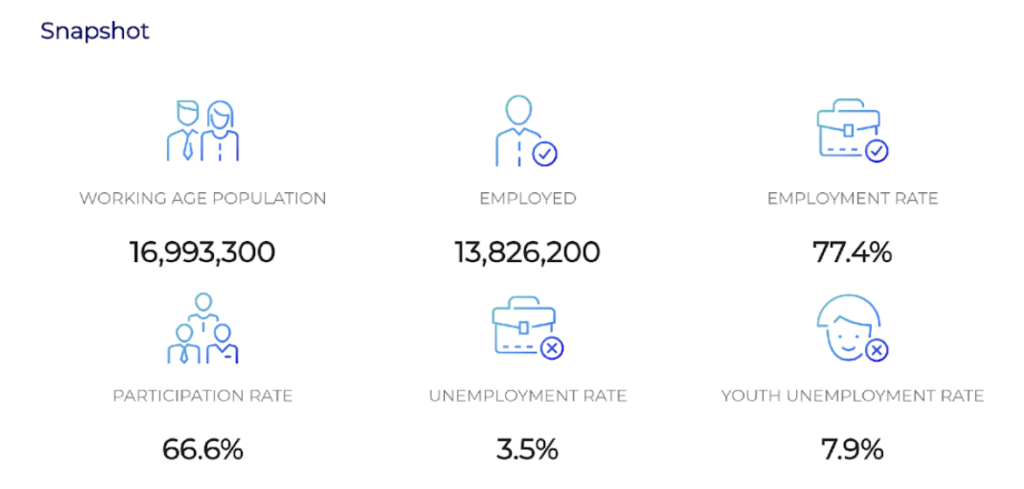
Labour Market Update (from Jobs and Skills Australia February 2023)
The Australian labour market is strong with continuing strong demand and supply in labour supply.
Total employment continued to increase with significant growth in full-time employment and low levels of underemployment which suggest the labour market is making better use of the workforce.
Total employment continues to shift towards jobs with higher skills levels requiring some level of post-secondary school qualification.
Recruitment activity has slowed while full-time employment is growing suggests that levels of worker retention may be improving.
The likelihood of filling an advertised role has increased slightly which together with the decline in recruitment activity suggests that skills shortages may have eased slightly in recent months.
However, compared to previous years, the likelihood of filling vacancies has declined, as have the average number of applicants and average number of suitable applicants per vacancy. These recruitment challenges are more acute (per vacancy) in regional areas than for capital cities, and skills shortages for Technicians and Trades workers occupations appear to be persistent over time.
Occupations with the highest vacancy rates (job vacancies as a proportion of employed people) are heavily concentrated around Engineering and Medical professions, mostly in regional areas.
Annual wage growth is more than 4.5% commensurate with the workforce shifting to higher-skilled jobs.
Resources and Events
January 2023 Australian Report

- Labour market trend is stable, despite worsening interest rate rise and inflation
- Underemployment rate remained stable (5.9%) (ABS, Dec 2022).
COVID
Political responses continue to have an impact on people movement (migrants travelling between country of origin and Australia and travellers going through transport hubs). For example, announcement has just been made regarding imposing sanction on travellers from China into Australia (“Chief Medical Officer Paul Kelly advised against mandatory COVID-19 testing for travellers from China”, ABC, January 3, 2023).
Managing skills shortage
Establishment of Jobs and Skills Australia (JSA), a statutory body to provide independent advice on current, emerging, and future workforce, skills, and training needs
Industry: Four services industries are projected to provide almost two-thirds (65.4%) of the total projected employment growth- 1) Health care and social assistance, 2) Professional, scientific and technical services, 3) Education and training, and 4) Accommodation and food services.
Occupational Groups: Increase in employment are projected across all eight broad occupational groups in the next 5 years, the strongest being employment growth for professionals (up by 14.7%) and community and personal service workers (up by 13.5%).
Skills Level: More than nine-in-ten new jobs over the next five years will require post-school education.
VET Outcomes
VET student outcomes 2022 shows an increase in improved employment status for VET qualification completers and part-completers.
In Australia, there were 415 240 apprentices and trainees in-training as of 30 June 2022, an increase of 21.6% from 30 June 2021.
In the 12 months ending 30 June 2022, compared with the 12 months ending 30 June 2021:
- Commencements increased by 22.1%
- Completions increased by 15.3%; however,
- Cancellations and withdrawals increased by 39.6%
Adding Value to Competency-based Training
released- A report on the underpinning Competency-based training (CBT) approach of VET that gives an overview of the learning and teaching delivery of VET in Australia.
Resources and events
CICA hosts an Green Careers and Sustainability Month in February 2023.
All webinars are proudly supported by CICA and are FREE to attend:
- Green Guidance. Sustainability moves from the periphery to center
- Sustainability: What does it have to do with career development?
- Skills for greener economies and societies –the potential of apprentices
- Decent Work, Sustainable Livelihoods and Well-being
CDAA’s new website and events
November 2022 Australian Report

- Labour market trend is stable (no significant difference since last quarter)
- Underemployment rate (6%) similar to last quarter (ABS, Sep 2022).
- Inflation continues to worsen (CPI rose 7.3% in 12 months, was 6.1% in the last update), while annual wage growth stays around 2.6% (ABS, Aug 2022)
Shortage increased by 31% (in 286 occupations, compared to 153 in the previous year).
The number of jobs advertised increased 42% compared to previous year.
Occupations in demand: health care professionals, teachers, IT, and construction.
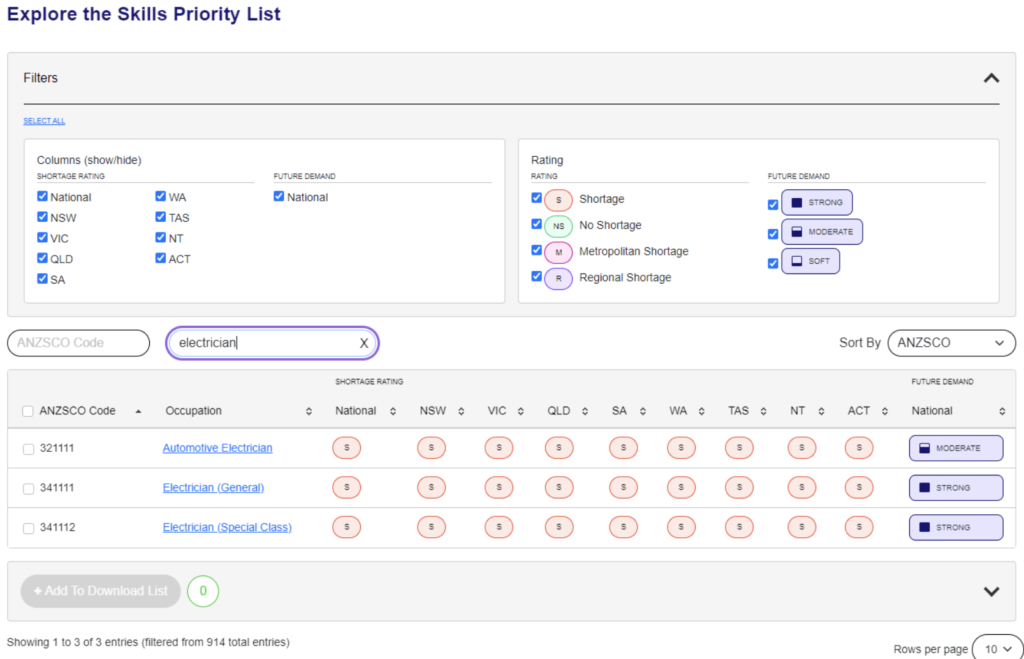
VET vs Undergraduate student outcomes
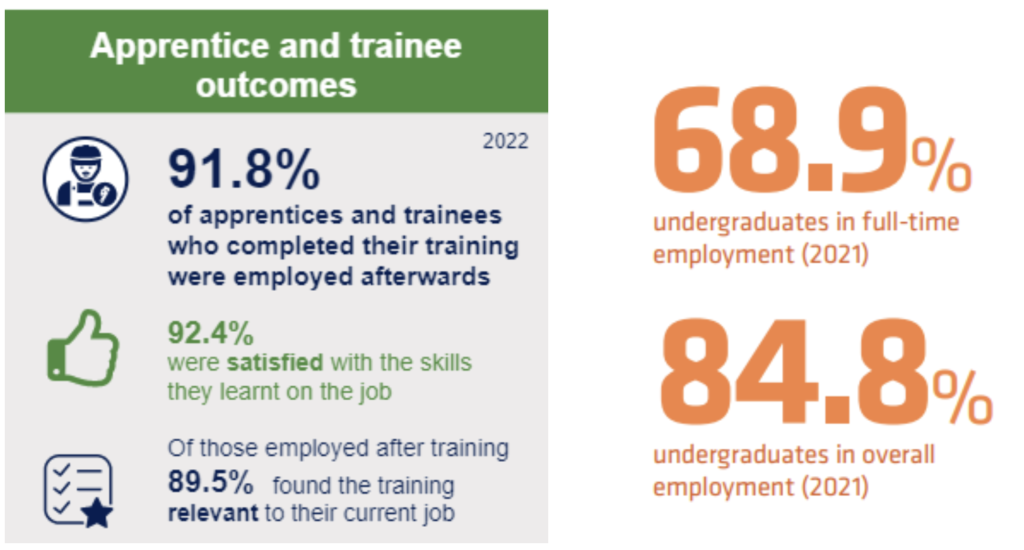
- Students: Investing in schools, fee-free TAFE (vocational education)
- Families: Cheaper childcare, expanding paid parental leave
- Health: Improving mental health and well-being, securing the National Disability Insurance Scheme,
- small business mental health and financial counselling programs
- Old people: Better aged care
- Women: Strengthening women’s safety
- Environment: Community Batteries and solar banks, protect great barrier reef, climate action
Resources and events
| NEW version of Australian Blueprint for Career Development
| Australian Strategy for International Education 2021-2030
| Strengthening socio-emotional competence for career practitioners Webinar by Fotini Vlackaki Careers and Social Inclusion Expert, Greece Ministry of Labour and Social Affairs Mary Tountopoulou Psychologist, Career Counsellor, Project Manager in EU Programs 8 Dec 5pm AEST Registration via CICA |
August 2022 Australian Report

- Unemployment rate (3.5%) the lowest in 48 years.
- However, underemployment rate is increasing (6.1%, previous month is 5.7%) (ABS, June 2022).
- Inflation rate rises sharply to 6.1%, the fastest annual increase in 21 years.
- Annual wage growth is 2.4%.
WORKFORCE AGE PROFILE
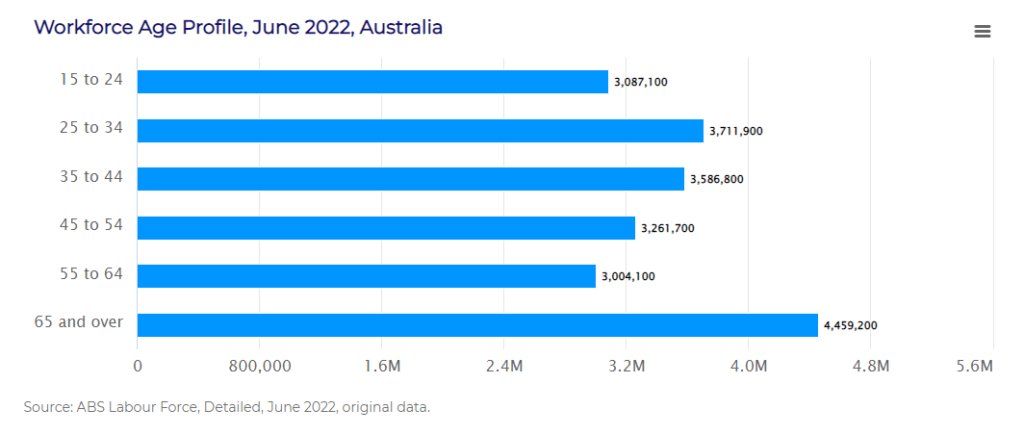
- Significant work participation from people aged 65 and over
POPULATION TRENDS

- Overseas migration yet to recover.
RESOURCES AND EVENTS
Navigating Life’s Career Transitions report by CDAA
Report highlights
- Key trends of career transitions
- The value of qualified career professionals’ help
- Designing and strengthening effective transition programs and services
- Case studies
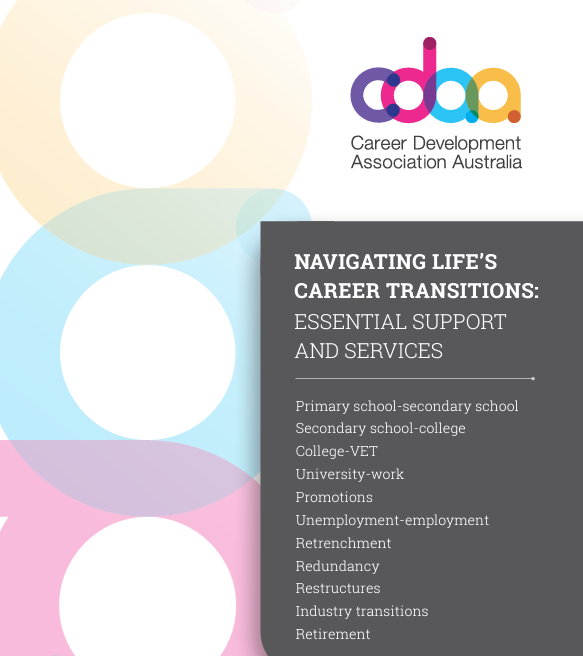
Meet the Future report by OECD
- A report calling on employers to contribute to work readiness development of young people
- Contains informative figures of youth career intentions
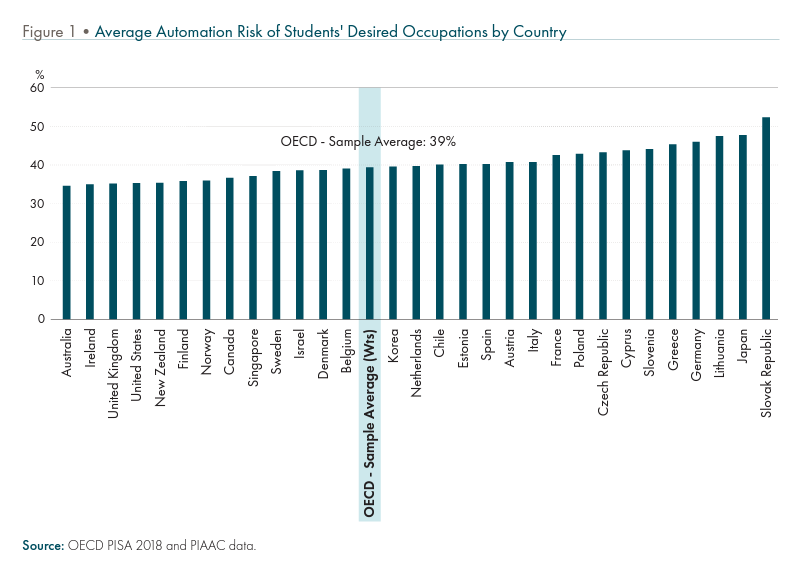
What counts when making career choices: lessons from Australian agriculture- Parents and carers webinar by Dr Nicole McDonald, CQU
9 Aug 4pm AEST
FREE Registration and other Myfuture webinars
Exploring the lived experience of Pacific youth in shaping their entry into their careers by Peter Apulu, BrownTale
11 Aug 2-3pm AEST
FREE Registration and other CICA webinars
May 2022 Australian Report
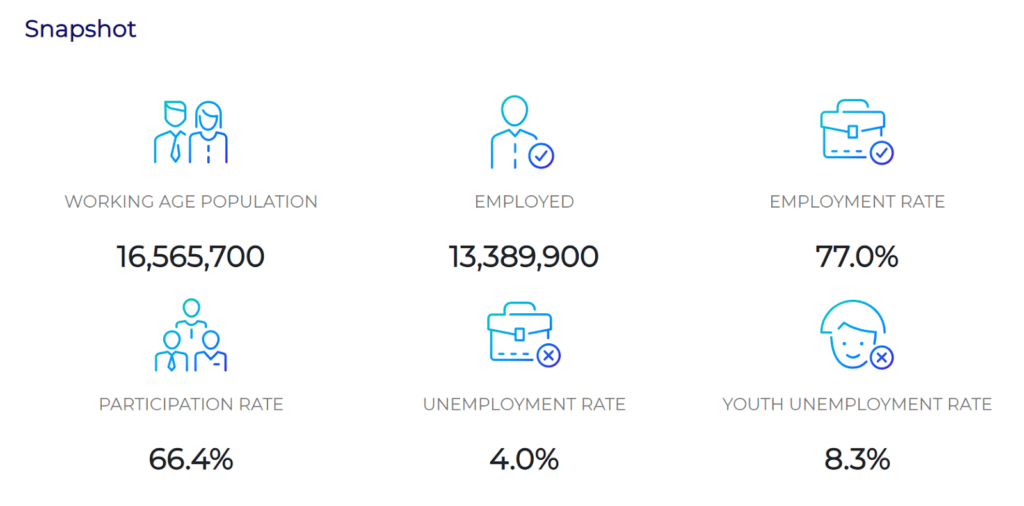
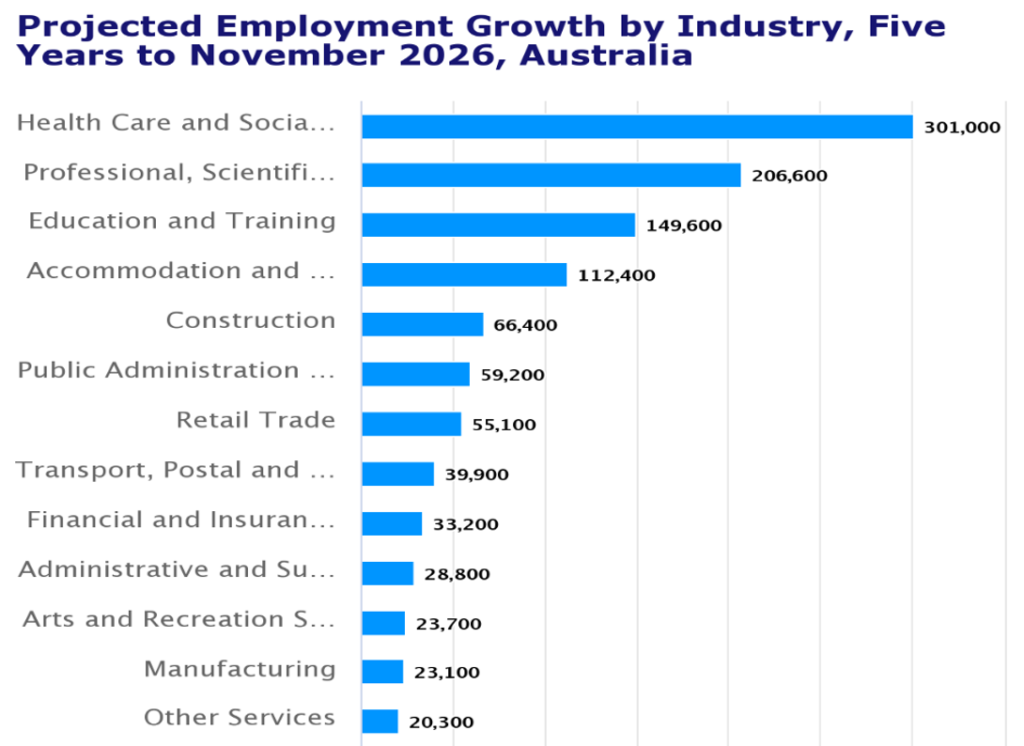
RESOURCES AND EVENTS
National Youth Commission Australia (2022) ‘You can’t see what you can’t see’: Careers education in secondary schools. This report summarises key issues of career education in secondary schools with four recommendations that the Commission believes will improve students’ careers education. |

National Youth Commission Australia proposed the Youth Futures Guarantee in 2020.
Since then, a series of reports and recommendations related to the nine pillars (see image on the right) of work have been published to support youth employment transition.
Career Development Association Australia Annual Conference (Coogee, Sydney)
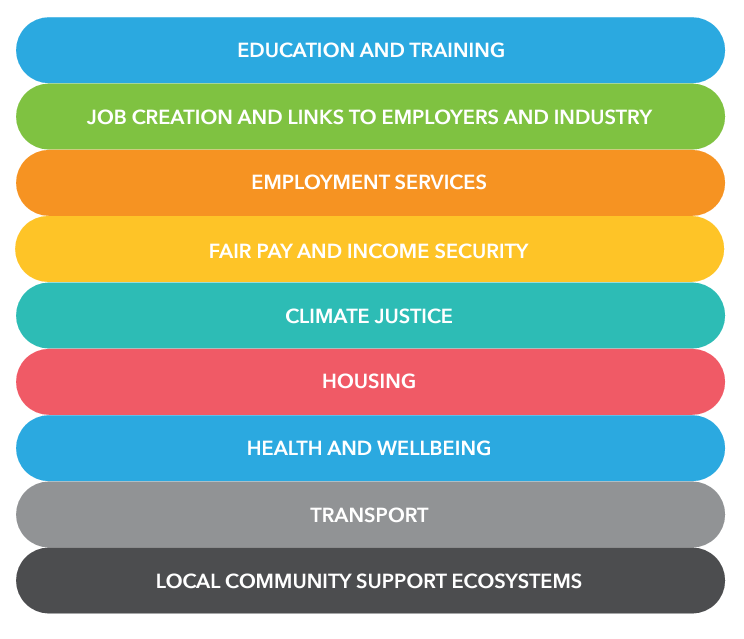
National Careers Week (16-22 May) https://careersweek.com.au/
The National Career Week is a Career Industry Council of Australia (CICA) initiative which enables career events and resources to be registered and communicated through the NCW platform.
Check events registered on the NCW in different states. Most of them are online events which means you can access them from anywhere in the world.
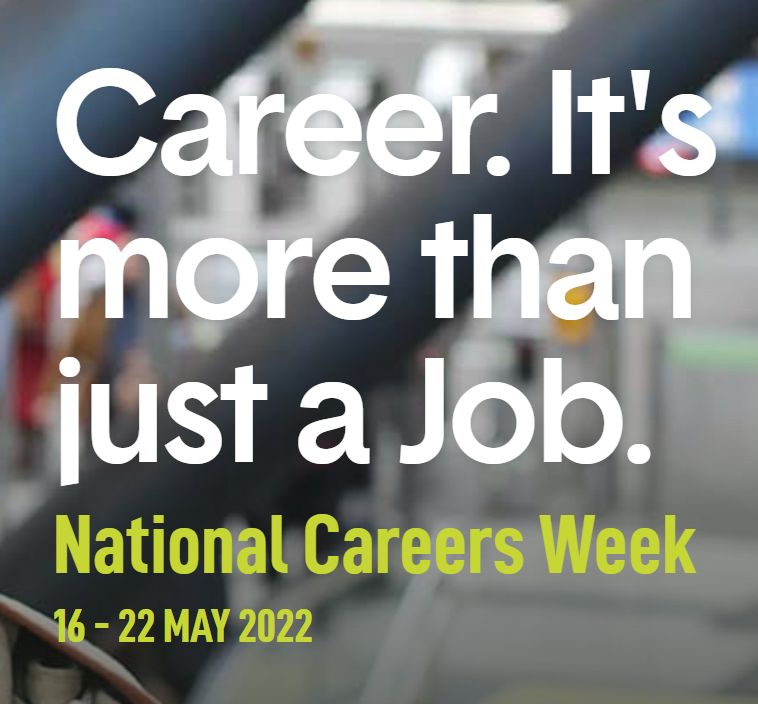
Career Development Association Australia Annual Conference (Coogee, Sydney)

February 2022 Australian Report
Labour market trends
- Unemployment rate 4.2%.
- 37.4% increase in job advertised over the year
- COVID 19 Occupation Risk Assessment
- Proximity score: Occupations with a higher proximity score require closer proximity to other people.
- Proximity Score Distribution by Industry By Labour Market Information Portal – Data Visualisations.
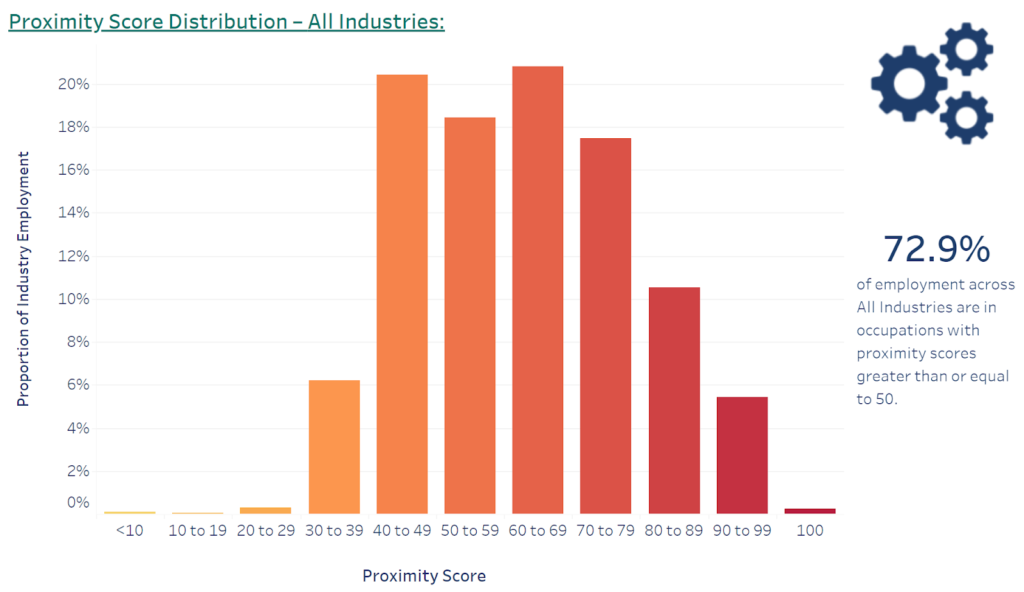
Policy: New visa initiatives for international students and graduates to meet labour shortage
- international student visa fee refund
- temporary removal of limits on working hours for student visa holders (subclass 500),
- replacement Temporary Graduate visas
- extended graduate ‘stay and work’ periods (subclass 485).
Career guidance at school
VIC & NSW governments initiatives of transforming career education at schools. New career practitioners are funded for 70 public secondary schools in WA.
Resources
Short videos – Career education in schools – Future Ready video playlist (CICA)
Tools – Career education from early childhood – Little Ripples

Research paper
Perception of skills does not equal employment outcomes – Brown, J. L., Hammer, S. J., Perera, H. N., & McIlveen, P. (2021). Relations between graduates’ learning experiences and employment outcomes: A cautionary note for institutional performance indicators. International Journal for Educational and Vocational Guidance, 1-20.
Article
Tips for Gender-diverse career counselling
Career Development of Transgender and Gender Diverse People (Robin C Ladwig)

Gender Identity Pride Flags indicate a (non-exhaustive) range of gender identities currently in use. Source: https://georgianpapers.com/2018/02/05/gender-georgian-papers/
UPCOMING
- National Careers Week 2022
- CDAA events and 2022 SYDNEY conference (May 12-14 Coogee, NSW)
- CICA events: https://cica.org.au/events/
November 2021 Australian Report
Health care/social assistance- #1 industry in every state
Other top industries:
- Professional, scientific & technical services
- Education/training
- Retail
- Construction
- Accommodation/Food services (QLD)
- Mining (WA)
Most jobs in major cities
- Adelaide – 77% of SA
- Sydney -70% of NSW
- Highest % of jobs in regions
- TAS 54%, QLD 51%
Workforce education level
- ACT- 49% of workforce has Bachelor degree or higher. VIC (41%), Sydney (46%)
- QLD, SA, TAS: more Cert III or higher VET qualifications than Bachelor degrees
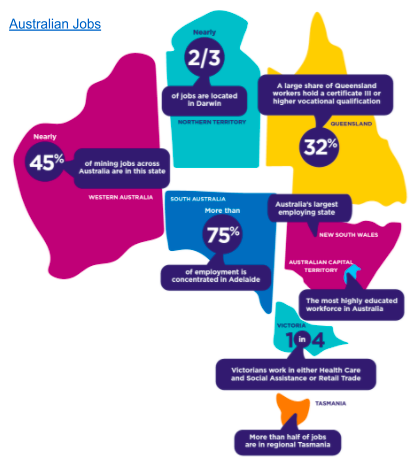
2020-21 Annual report of National Leadership on Education, Skills and Employment- transparency in public governance, performance and accountability
National Centre for Vocational Education Research (NCVER):
- Employers’ use and views of the VET system 2021
- VOCEDplus database: Free research database
Report on the usage and effectiveness of the Australian Blueprint for Career Development (ABCD): Prepared by the Career Industry Council of Australia, the national peak body for the career industry, commissioned by the National Careers Institute
- 90% of career practitioners bring expertise from other industries
- ¾ of career practitioners have used the Blueprint, 2/3 say the Blueprint resonates with current practice, 1/3 say the Blueprint is easily recognisable
Events
CICA events, NAGCAS events and 2021 conference (30 Nov- 2 Dec, online), CDAA events and 2022 conference (May 12-14, Sydney)
August 2021 Australian Report
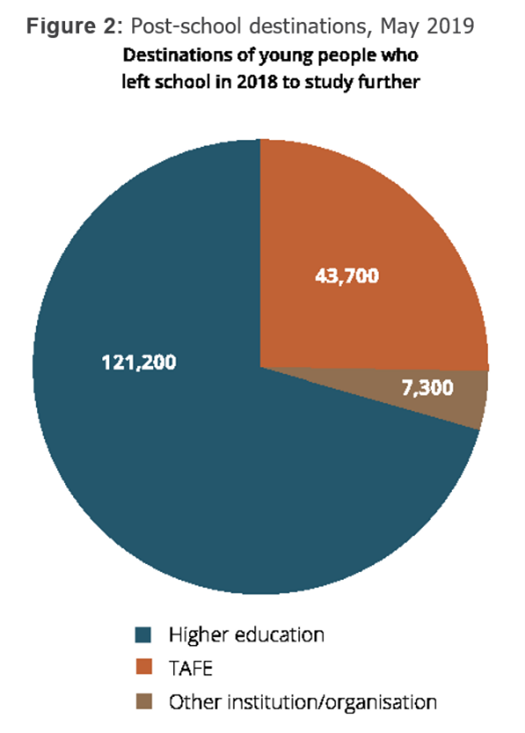
Covid disaster payments (since June 2021): expenditure to date over $827 million
Policy direction- towards a balanced spread of uni and VET study destinations (Figure on the right)
Looking to the Future: Report of the Review of senior secondary pathways into work, further education and training (Department of Education, Skills and Employment, Australia Government)
Latest employment data (reference period June 2021)
Unemployment rate decreased to 4.9%, Underemployment rate increased to 7.9%
Participation rate remained at 66.2%, Total vacancies (May) were 362,500 (an increase of 23.5% from Feb)
Food for thought: Barriers to labour force participation (latest date: 2018-2019 financial year)
Of the 2.7 million people who wanted a job or preferred to work more hours, most (2.3 million) were available to start within 4 weeks.
Those who not available to start a job or work with more hours within four weeks- the main reasons were:
- Women: “Caring for children” (48%)
- Men: “Long term sickness or disability” (32%)
Useful Resources: Nowcast of Employment by Region and Occupation (NERO)
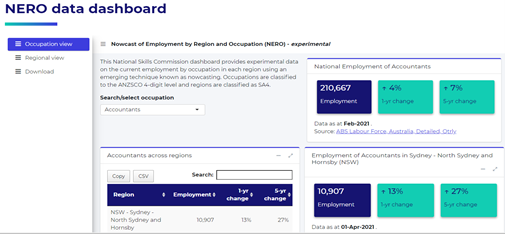
Upcoming events:
May 2021 Australian Report
- $90 billion JobKeeper wage subsidy ended on 28th March 2021
- 17,000 UNI jobs lost to COVID-19
April employment data
- Unemployment rate decreased to 5.6%, Underemployment rate decreased to 7.9%
- Participation rate increased to 66.3%, Increased job vacancies of 13.7% from Nov 2020
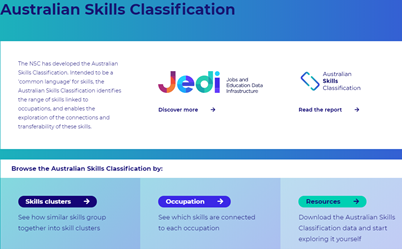
Australian Skills Classification NEW!
sets out the key core competencies, specialist tasks and technology tools required for 600 occupations in Australia. It complements the Australian and New Zealand Classification of Occupations (ANZSCO).
https://www.nationalskillscommission.gov.au/our-work/australian-skills-classification
Four industries will contribute to 62.1% of total employment growth by 2024
(https://lmip.gov.au/PortalFile.axd?FieldID=3191522&.docx)
- Healthcare and Social Assistance
- Professional, Scientific and Technical Services
- Education and Training
- Construction
National Careers Week 17-23 May 2021 https://careersweek.com.au/
February 2021 Australian Report
National - International
- K-12 School Year commenced on 28 January 30
- VET Term 1 starts 1 February
- University Semester 1 starts end of February
Students are returning to in-school face to face classes.
New National Skills Commission Report – The shape of Australia’s post COVID-19 workforce
The shape of Australia’s post COVID-19 workforce builds on the understanding of Australia’s workforce and skills recovery from COVID-19.
The report analyses the impact of the pandemic on our labour market, through scenario modelling, and profiles our resilient occupations framework.
While it is clear COVID-19 has changed how we do business and work, the latest ABS data show signs that the labour market is recovering. This is supported by the NSC’s own monitoring of internet vacancies and our own employer surveys. https://www.nationalskillscommission.gov.au/shape-australias-post-covid-19-workforce
Productivity Commission, National Agreement for Skills and Workforce Development Review, Study Report
A skilled workforce is fundamental to Australia’s future. As a pillar of our post-school education system, the vocational education and training (VET) system enables people to develop and maintain the skills needed to participate effectively in society and the economy.
VET is a shared area of responsibility between the Federal, State and Territory governments. The National Agreement for Skills and Workforce Development (NASWD) defines the framework for intergovernmental collaboration in VET.
The Government has asked the Commission to review progress against the targets, outcomes and performance indicators in the NASWD and to assess whether it is still an effective long-term framework for intergovernmental cooperation on VET policy. The final has now been released. https://cica.org.au/wp-content/uploads/skills-workforce-agreement.pdf
Career guidance policy and practice in the pandemic: results of a joint international survey
This report, recently published through CEDEFOP, captures changes in career guidance policies, systems and practices arising from the Covid-19 pandemic, as observed across 93 countries globally between the end of June and the beginning of August 2020.
The research shows that career guidance systems received some policy attention and increased funding in several countries enabling them to adapt from mainly physical to mainly online services, and enabling easier distance access to services. There was increased cooperation among career guidance practitioners and with other professionals.
Increased demand for services was noted, especially from school students, the unemployed, and workers most at risk of unemployment. Respondents highlighted the need for individualised services, given the uncertainty created by the pandemic: career counselling, coaching, mentoring, and psychosocial support. But problems of access to services exist, especially for persons with disabilities, migrants and refugees, and the pandemic has made it more difficult for these groups to access services. https://cica.org.au/wp-content/uploads/4193_en.pdf
CDAA
Meetings, networking events and webinars commence from February.
NCI
The National Careers Institute (NCI) was established to ensure people have access to authoritative and accurate careers information and support irrespective of their age or career stage. People can visit the Your Career website to be connected to further education, training or work options to support their career needs or goals. https://nci.dese.gov.au/
Parents and Guardians ‘Facebook Live’ event – 2 Feb
Parents/guardians of 2020 school leavers, and of young people not sure of their education, training or work options, can attend a live Facebook information session.
October 2020 Australian Report
The COVID 19 situation has been very different across the states and territories, with Melbourne the most affected by a strong second wave. Restrictions have been slowly relaxing – all schools are back, universities online, home office rules, etc.
Key statistics – Seasonally adjusted estimates for September 2020
- Unemployment rate 6.9%
- Underemployment rate increased to 11.4%
- Participation rate decreased to 64.8%
Thousands of university students will graduate this year into the worst jobs market since the 1990s recession, as economists warn it could take them years to rebound from lower wages.
NATIONAL
CICA joins the CRC Longevity initiative as an Industry Partner (https://crclongevity.com/)
The Australia-wide, collaborative CRC Longevity brings together industry, government and researchers to deliver deep insights that drive innovation in new services, products and policies for older Australians. It will be guided by the needs and wants of individuals and communities, providing industry and government with hard evidence to support investment, and lead to approximately $33 billion in annual economic opportunity by 2030, increasing GDP, exports and growth in high value employment for Australians, and positioning Australia as a leader in the global longevity economy.
CICA represents the industry at a Productivity Commission Roundtable
The Productivity Commission released its interim report on the National Agreement for Skills and Workforce Development Review. As part of its consultation program, the Commission invited CICA as a key stakeholder CICA representing the views of the career industry including the voice of the member associations and their members, to attend a roundtable on aspects of a User-centered Model in Vocational Education and Training.
The National Careers Institute launched the next version of its website! (https://nci.dese.gov.au/)
This version makes it easier to navigate the site to discover top career advice from across Australia
Interest in Micro-Credentials
Everyone, even governments, seem to be excited about micro-credentials. What are they and why is there so much interest? In the latest Career Panorama blog post, Emeritus Professor Beverley Oliver explores whether they really can help careers flourish post-COVID, and if so, what learners should look for. To read the post, click here
CDAA & CICA Webinars


- Communicating Through Active Engagement – Dr Norman Amundson and Andrea Fruhling – University of British Columbia
- We can’t all be at the top of the ladder: Problems with social mobility as an outcome of career guidance – Professor Tristram Hooley
- Helping People live with Chaos in their Careers – Professor Jim Bright
July 2020 Australian Report
NATIONAL
Australian states have very different COVID-19 situation at present
- Western Australia, Queensland, South Australia, Tasmania, Northern Territory have very low numbers and have cautiously re-started their economy and educational institutions. The two most populous states, New South Wales and Victoria have bigger numbers of infection.
- Melbourne, the capital of Victoria is currently in a 6-week Stage 3 lockdown due to a second wave, with high number of community transmission ( 300-400+/day).
Only kindergartens and childcare centres are open, schools went back to remote learning, with the exception of Year 12 students and children of emergency and essential workers and children at risk. Universities commence semester 2 ( end of July) via their digital platforms.
Unemployment increased 69,300 to 992,300 people – 7.1% currently, likely to grow
Government stimulus measures JobKeeper – JobSeeker – JobMaker
The Australian Labour Market Information Portal: new publications of data and research insights, including more information relating to the labour market impacts of the COVID-19 pandemic.
- Jobs in Demand Employer Survey Results This employer survey identifies where job opportunities continue to exist in the Australian labour market despite the economic downturn caused by COVID-19. Information available includes which jobs are in demand and what qualifications, skills and experience employers are seeking in these roles. Key findings will continue to be published on a weekly basis.
- Impacts of COVID-19 on businesses – future staffing expectations and business confidence: Using data up to 26 June, this report provides an update on businesses’ future staffing expectations, and their confidence in remaining open for the next 6 months. https://lmip.gov.au/default.aspx?LMIP/Gaininsights/COVIDInformation/ResearchandInsights
The National Skills Commission’s future market focus: The NSC is developing a range of information, resources and tools to support Australia’s economic recovery from COVID-19. It will focus on determining skills shortages and surpluses, assessing the nature of labour market recovery, analysing structural shifts and identifying current Jobs and Education Data Integration or JEDI is aiming to deliver world-leading intelligence on skills needs. By harnessing the best and widest range of labour market, skills and education data available, JEDI can identify what skills from a person’s current or previous employment can transfer to different jobs that use similar skills. It also identifies skill gaps between the different jobs recommended before showing VET courses available to fill the gap. https://www.nationalskillscommission.gov.au/part-2-matching-skills-and-jobs-post-covid-19
CDAA
- CDAA published a Position Statement and raises eight critical issues that impact people’s careers
- Australia needs a life-long career guidance system
- Increasing digital Inclusion
- Producing up-to-date career information
- Reducing insecure work
- Supporting unemployed workers
- Supporting people studying
- Reshaping working Australia beyond COVID-19
- Career Conversations and Webinars continue online and other events, previously face to face have moved online too

April 2020 Australian Report
Responses to COVID-19: Embracing digital learning and online collaboration
Schools and Universities in total lockdown – quick shift to digital learning platforms. https://cica.org.au/education-responses-to-covid-19-embracing-digital-learning-and-online-collaboration-oecd/
The Australian Labour Market Information Portal
the Australian labour market is changing rapidly as the COVID-19 situation continues to develop. Publishing research and analysis on labour market conditions to ensure the public has the information and understand the effects that COVID-19 is having on the labour market, and to explore how jobs may be changing and jobs that are in demand.
The National Careers Institute was established as part of the 2019-20 Federal Budget measure, ‘Delivering Skills for Today and Tomorrow’ which lays the foundation for the Government’s commitment to strengthening and modernising the skills and careers sectors.
Based on the recommendations of the Strengthening Skills: Expert Review of Australia’s Vocational Education and Training System, the Institute will provide a single authoritative government source of careers information, with a particular focus on marketing and promoting vocational careers. The ongoing role and functions of the Institute will be informed by research and collaboration with governments, industry, employers and education and training providers.
CDAA
Finding Work in Difficult Times – Top Suggestions from Experts With the nation’s unemployment figures continuing to rise in response to the current COVID-19 crisis, finding work has become immensely challenging for many Australians. Members of the Career Development Association of Australia have come together to offer their top suggestions for maximising the chances of finding work now and as the “new normal” emerges.
Career Conversations continue online and other events, previously face to face have moved online too
CDAA Annual General Meeting – was held online on April 2
City-wide online morning tea networking meeting in Melbourne on April 6
November 2019 Country Report
Big data: mapping a path to a new career
A new paper that explores how large, local and international data sets can help workers and job seekers transfer their existing skills to new jobs and identify new skills to develop. Reskilling Australia: a data-driven approach, published by the Department of Employment, Skills, Small and Family Business, identifies that moving towards a skills-based approach to labourmarket analysis could help Australia respond to this changing demand for skills. After analysing US careers database O*Net and Burning Glass Technologies job advertisement data from 2.6 million online job postings in Australia, the department developed a ‘job similarity model’ that shows how the skills of one job compare to another to help identify practical avenues to a career change. “We can look at occupations that are likely to decline and then map out pathways to jobs in growing sectors.”
CDAA
National Conference in Canberra 19-21 September ‘Inspiring Excellence in Career Development: Integration’. 92% of delegates rated the conference as good to excellent, consistent number of attendees and sector breakdowns compared to the last two years
September 2019 Country Report
Prepared by Agnes Banyasz
National – CICA
‘100 Jobs of the Future’ Report
Ford Australia, Griffith University and Deakin University released their ‘100 Jobs of the Future’ report — complete with potential job titles, descriptions and required skills. They also created a quiz to help people find a role that matched their skills and interests. To see what the future of work would look like, the researchers analysed existing work futures literature and interviewed experts from industries they consider critical to future work, including health, agriculture, engineering and materials sciences, transport and mobility, computing, artificial intelligence (AI), commerce and education. Access full report : https://100jobsofthefuture.com
New report by the Grattan Institute: Risks and rewards: when is vocational education a good alternative to higher education?
Over the past 20 years, higher education in Australia has expanded rapidly. By contrast, vocational education attainment rates have fluctuated without much long-term change. There are concerns that students are encouraged to enrol in higher education, overlooking potentially better-paid vocational education alternatives in areas of labour-market need. These concerns are greatest for low-ATAR (Australian Tertiary Admission Rank) university students, whose numbers have increased significantly. Access full report: https://cica.org.au/wp-content/uploads/Risks-and-Rewards-Grattan-Institure-August-2019.pdf
CDAA
Practitioners volunteered at the Melbourne Career Expo – 26-28 July
The total attendance across the three days was 16 058 people. CDAA volunteers contributed approximately 174 career check-ups, delivered 16 informative workshops to over 450 people, answered hundreds of questions at the front desk and conducted approximately 227 express resume reviews. The grateful feedback expressed by people as they left the stand were testament to dedication, expertise and care.
New performance-based funding model for Australian universities
CDAA endorses the Federal Government’s new performance-based funding model for universities, which will tie increased funding to four measures: graduate employment, student success, student experience and socioeconomic factors. The key driver for the model is producing job-ready graduates with the skills to succeed in the modern economy by incentivising universities to focus on their core business. The new model will be implemented in 2020.
National Conference in Canberra in less than a month:19-21 September ‘Inspiring Excellence in Career Development: Integration’
New Insights about Careers of Flexible Knowledge Workers in IT
Presented by Dr Justin Field to learn how flexible knowledge workers in IT navigate their careers.
Career Conversations August 2019 – Adult
The August Career Conversation for practitioners working with adult clients will discuss Are demands on career practitioners changing?
Interview with Award Winning International Coach – With Riyaz Javanjee
In this September webinar hear CDAA WA Division President Rebecca Herbertson interview award winning international coach Riyaz Jivanjee
CEAV
Industry Immersion Experience Program for Year 7 to 10 students in eligible Victorian government schools to actively engage in a range of industry immersion experiences that build their knowledge of the world of work and future workforce skill requirements. The CEAV in partnership with the Department of Education and Training is offering students the opportunity to spend a day on site at an industry workplace in the following growth areas: Construction Technologies, Creative Industries, Defence Technologies, Digital Technologies, Food and Fibre, International Education, Medical Technologies and Pharmaceuticals, Professional Services, Retail, Transport, Distribution, Logistics and Postal, Transport Technologies, Visitor Economies
Students will hear from industry leaders, tour facilities and participate in career development activities that will provide them with valuable and meaningful insight and understanding into the current world of work and the future needs of industry. The program is free and comes with a workbook for students with pre and post Immersion activities, and a teacher resources kit including lesson plans mapped to the Victorian curriculum.
NAGCAS
National Careers Registration Webinar Series,
In preparation for the Career Registration Forum to be held during the National Conference in Perth on Monday 25th November 2019, a four-workshop webinar series is being conducted. The aim is three-fold:
- to ensure a similar understanding of Careers Registration and its impact as reported by Universities in Higher Education in the UK
- to explore whether there is a collective interest across Australian Universities to adapt/adopt Career Registration
- (if relevant) to explore what an Australian version of Careers Registration may look
Access full UK project report https://www.heacademy.ac.uk/system/files/hub/download/where_are_you_right_now_-_using_careers_registration_to_support_employability_in_higher_education.pdf
News and Tools from Australia
by Agnes Banyasz, APCDA Australia Representative

In May, the federal government released the 2019 Australian Jobs publication, which provides a comprehensive overview of trends in the Australian labor market to support job seekers and providers, career advisers, those considering future training and work and people interested in labor market issues. Australian Jobs allows users to explore a wide range of factors, e.g. industry snapshots, occupations, training pathways, location of jobs and future employment prospects. The analysis and the excellent data visualisation in this publication provides an introduction to and overview of some of the factors which can be considered in understanding employment conditions and trends. Click here to access and read full report.
A month later, in June, Deloitte released an important report ‘The path to prosperity – Why the future of work is human’. This is the 7th paper in the Building the Lucky Country Series, which was developed to prompt debate and conversations across business, industry associations, government and the media on issues facing the Australian economy. The June Deloitte report launches the Australian economic discussion from the very positive premise of Australia’s 27 years of continuous economic growth, even through a period of global economic volatility.
(Australians benefit from high living standards. The third highest in the world according to the Human Development Index, http://hdr.undp.org/.) Then the report moves to the ‘call for action’ part; stating that Australia must get to work and use the opportunity to make better choices about work, workers and workplaces to pave the path to prosperity for all Australians. The Deloitte report continues with the assertion that a big part of Australia’s productivity story will be about people. Click here to access and read full report.
Both the previously mentioned May and June reports contain a wealth of extremely valuable data and information for carer practitioners to use. You may wonder how all this useful information gets to the general public, who may not look at professional organizations’ or government websites. Additionally, you may ask the following question. How do young job seekers, later year career changers, recently arrived immigrants obtain the most up to date and relevant information? Both the May & June reports are high-quality free resources, that are utilizing up-to-date data, integrate with career planning tools and present these on a friendly user interface. MyFuture, grounded in best practice and career research is a prime example for this; a free platform that can guide an individual of any age from an idea, or sometimes no idea stage to course, employment, industry research, career building blocks, job search steps and actions. The well-oiled cycle of up-to-date research informing best practice user material should and hopefully will contribute to good career choices and prosperity for all.
Applying Theory to Career Development in Schools
by Dr. Catherine Hughes, Grow Careers, Australia
 Career development spans infancy to post-retirement (Hartung, 2013; Super, 1990). It refers to the process managing life, learning and work over the life course (Ministerial Council for Education, Early Childhood Development and Youth Affairs, 2009). It is widely understood that the world of work is experiencing unprecedented change, making the nature of work in the future uncertain and unpredictable. This highlights the importance of providing career development programs and services in schools. Firstly, career development programs in schools help young people to successfully cope with societal expectations about preparing for and adapting to the work role (Super, 1990). Secondly, today’s school students will need to adapt to multiple transitions across many jobs over the life course (Savickas, et al., 2009). Career development programs and services for all students is one way to ensure that the nation’s youth are equipped to effectively self-manage their career as they respond to a lifetime of career transition and change.
Career development spans infancy to post-retirement (Hartung, 2013; Super, 1990). It refers to the process managing life, learning and work over the life course (Ministerial Council for Education, Early Childhood Development and Youth Affairs, 2009). It is widely understood that the world of work is experiencing unprecedented change, making the nature of work in the future uncertain and unpredictable. This highlights the importance of providing career development programs and services in schools. Firstly, career development programs in schools help young people to successfully cope with societal expectations about preparing for and adapting to the work role (Super, 1990). Secondly, today’s school students will need to adapt to multiple transitions across many jobs over the life course (Savickas, et al., 2009). Career development programs and services for all students is one way to ensure that the nation’s youth are equipped to effectively self-manage their career as they respond to a lifetime of career transition and change.
Theories of career development guide career development practitioners in the selection of career interventions, their content and delivery. The vocational problems addressed and the populations served are key criteria in determining the usefulness of a theory as a guide to practice (Richardson, Constantine, & Washburn, 2005; Savickas, 2002). While acknowledging the usefulness of all career theories of relevance to young people, the five career theories initially listed and then summarized below support school career development practitioners in providing developmentally appropriate, concrete, socially conscious, and contemporary programs and interventions that prepare students to self-manage their career in an uncertain and changing world of work.
- Life-span, life-space theory (Hartung, 2013; Super, 1990)
- Theory of vocational personalities and work environments (Holland, 1997)
- Theory of circumscription and compromise (Gottfredson, 2005)
- Cognitive information processing theory (Sampson, Reardon, Peterson, & Lenz, 2004)
- Career construction theory (Savickas, 2013)
- Life-span, Life-space Theory Life-span, life-space theory is concerned with five stages of career development (Growth, Exploration, Establishment, Maintenance and Decline), the vocational development tasks that individuals encounter at each career stage, processes for managing these vocational development tasks, the social context in which career development occurs, self-concept and the interactions between life-span, life-space and self-concept. Life-span, life-space career theory helps school students to understand how to prepare for making and implementing career decisions during the school years and beyond. Life-span, life-space career theory guides career development practitioners in designing developmentally appropriate career interventions that are aligned with the stage of career development of students (Growth or Exploration) and current and impending vocational development tasks. Interventions should also take into account the life roles relevant to school students’ lives and their potential influence on factors such as career maturity, career adaptability and career choice readiness, as well as helping students to clarify their vocational self-concepts.
- Theory of Vocational Personalities and Work Environments
Person-environment fit theories such as Holland’s (1997) theory of vocational personalities and work environments help school students to understand the relationship between self and occupations. Holland’s six vocational personality and work environment types provide a language and a structure to articulate this relationship. Person-environment fit theories help students to solve problems about identifying congruent occupations and exploring post-school options. The theory of vocational personalities and work environments assists career development practitioners to support students in identifying and exploring post-school options they are likely to find satisfying. - Theory of Circumscription and Compromise
This career theory reminds us of the importance of career interventions that challenge gender stereotypes in occupations and interventions that raise aspirations. According to the theory, children as young as 6-8 years of age start to reject occupations that are perceived to be incompatible with their gender identity. Further, by early adolescence young people are aware of an occupational hierarchy, have learned the types of occupations their families and communities reject on the basis of social prestige, and are aware of their intellectual ability relative to that of their peers (Gottfredson, 2005). These processes result in a zone of acceptable occupational alternatives, excluding occupations perceived to be of the wrong sex type, occupations perceived to be academically too demanding and occupations inconsistent with perceived social standing. This means that without intervention, many students may be unwilling to explore non-traditional career and course options. - Cognitive Information Processing Theory
Cognitive information processing theory is concerned with the knowledge base required for effective career problem-solving and decision-making, information processing skills that facilitate the transformation of self-knowledge and knowledge about learning and work options and the world of work into meaningful and satisfying career decisions. The skills learned through the cognitive information processing models prepare students for making good career decisions throughout life whenever they encounter career transitions (Peterson, Sampson, Lenz, & Reardon, 2002). Cognitive information processing career theory has turned its attention to practical issues such as how to deliver cost-effective career services that meet the career development needs of all students in contexts such as schools where the number of students to serve is large compared to the number of full-time equivalent career development practitioners (Sampson, Reardon, Peterson, & Lenz, 2004). This approach enables schools to align career interventions and intensity of career development practitioner support to the level of career choice readiness of students, resulting in a cost-effective approach to school career service delivery that neither over-serves nor under-serves students and uses career development practitioner resources where they are needed most.
10. Career Construction Theory
Career adaptability is an important construct from career construction theory. Career adaptability is comprised of self-regulation strengths that individuals can draw on to solve career problems and cope with the demands of vocational development tasks, work traumas and career transitions (Savickas, 2002, 2012). These self-regulation strengths include a concern about one’s vocational future, a belief that one has some personal control over it by exploring, refining and deciding, attitudes of curiosity expressed by exploring self and possible future learning and work scenarios, and confidence in taking steps to pursue one’s aspirations (Savickas, 2013). “Increasing a person’s career adaptability … is a central goal in career education and counseling” (Savickas & Porfeli, 2012, p. 663), and therefore should be a central goal of school career development programs and services. The career construction theory focus on career stories to explore life themes that can be projected into future learning and work possibilities can be blended with a more concrete person-environment fit approach for deeper learning and to enhance student understanding of the relationship between self and the world of work. The Integrative Structured Interview (McMahon & Watson, 2012) is a useful tool for this purpose. After completing activities where students explore their vocational personality, they reflect on the results and convey small stories about their assessed vocational personality profile and its meaning within the context of their life and for career possibilities for the future.
Conclusion
Career development is lifelong and therefore it is appropriate that individuals are exposed to career development support throughout life. For this reason, it is important that schools deliver career development programs and services to all students. Further, providing career development programs and services in schools is one way that nations can equip students with the career self-management skills to enable them to respond appropriately to multiple career transitions throughout life. Theories of career development serve as a guide for schools to construct developmentally appropriate career interventions to equip today’s students with the career self-management skills they will need for the future world of work.
References
Gottfredson, L. S. (2005). Applying Gottfredson’s theory of circumscription and compromise in career guidance and counseling. In S. D. Brown & R. W. Lent (Eds.). Career development and counseling: Putting theory and research to work (pp. 71-100). Hoboken, NJ: John Wiley & Sons Inc.
Hartung, P. J. (2013). The life-span, life-space theory of careers. In S. B. Brown & R. W. Lent (2013). Career development and counseling: Putting theory and research to work (2nd ed.), pp. 83-113. Hoboken: NJ, John Wiley & Sons, Inc.
Holland, J. L. (1997). Making vocational choices: A theory of vocational personalities and work environments (3rd ed.). Odessa, FL: Psychological Assessment Resources. Ministerial Council for Education, Early Childhood Development and Youth Affairs (2009). The Australian Blueprint for Career Development, prepared by Miles Morgan Australia, Commonwealth of Australia, Canberra. Accessed 23 March 2019 [Online] Available at: http://education.gov.au/australian-blueprint-career-development.
McMahon, M. & Watson, M. (2012). Telling stories of career assessment. Journal of Career Assessment, 20, 440-451.
Peterson, G. W., Sampson, J. P. Jr. Lenz, J. G., & Reardon, R. C. (2002). A Cognitive information processing approach to career problem solving and decision making. In D. Brown (Ed.). Career choice and development (4th ed., pp. 312-369). San Francisco, CA: Jossey-Bass Inc.
Richardson, M. S. (1993). Work in people’s lives: A location for counseling psychologists. Journal of Counseling Psychology, 40, 425-433.
Richardson, M. S., Constantine, K., & Washburn, M. (2005). New directions for theory development in vocational psychology. In W. B. Walsh & M. L. Savickas (Eds.), Handbook of vocational psychology (3rd ed., pp. 51-83). Mahwah, NJ: Lawrence Erlbaum.
Sampson, J. P., Peterson, G. W., Lenz, J. G., & Reardon, R. C. (1992). A cognitive approach to career development and services: Translating concepts into practice. The Career Development Quarterly, 41, 67-74.
Sampson, J. P., Reardon, R. C., Peterson, G. W. & Lenz, J. G. (2004). Career counseling & services: A cognitive information processing approach. Belmont, CA: Brooks/Cole – Thompson Learning.
Savickas, M. L. (2002). Career construction theory. In D. Brown (Ed.). Career choice and development (4th ed., pp. 149-205). San Francisco, CA: Jossey-Bass Inc.
Savickas, M. L. (2012). A paradigm for career intervention in the 21st Century. Journal of Counseling and Development, 90, 13-19.
Savickas, M. L. (2013). Career construction theory and practice. In S. B. Brown & R.W. Lent (2013). Career development and counseling: Putting theory and research to work (2nd ed., pp. 147-183). Hoboken: NJ, John Wiley & Sons, Inc.
Savickas, M. L. & Baker, D. B. (2005). The history of vocational psychology: Antecedents, origin, and early development. In W. B. Walsh & M. L. Savickas. Handbook of vocational psychology (3rd ed., pp. 15-50). Mahwah, NJ:Lawrence Erlbaum.
Savikas, M. L., M. L., Nota, L., Rossier, J., Dauwalder, J-P, Duarte, M. E., Guichard J., Soresi, S., Van Esbroeck, R., van Vianen, E. M. (2009). Life designing: A paradigm for career construction in the 21st century, Journal of Vocational Behavior, 75, 239-250.
Savickas, M. L. & Porfeli, E. J. (2012). Career Adapt-Abilities Scale: Construction, reliability, and measurement equivalence across 13 countries. Journal of Vocational Behavior, 80, 661-673.
Super, D. E. (1990). A life-span, life-space approach to career development. In D. Brown and L. Brooks (Eds.), Career choice and development: Applying contemporary theories to practice (2nd ed., pp. 197-261). San Francisco, CA: Jossey-Bass Inc.
Super, D. E., Savickas, M. L., & Super, C. M. (1996). The life-span, life-space approach to careers. In Brown, D. & Brooks, L. Career Choice and Development (3rd ed.), CA: Jossey-Bass Inc., pp121-178.
Hope, Connections and more from Australia
by Agnes Banyasz
Sharing Government Level News
 Hope is not a strategy – our shared responsibility for the future of work and workers
Hope is not a strategy – our shared responsibility for the future of work and workers
The Australian Senate Select Committee on Future Work and Works have released their report. Few concepts are more complex and less tangible than ‘the future’. Work is an integral part of life for most adult Australians. At a fundamental level, the work that we do pays for the necessities of life and determines our standard of living. It is also part of our identity, has the capacity to be engaging and a source of satisfaction, or to be a source of uncertainty and stress. The availability and stability of decent work and decent pay is important on an individual, family and community level. The social and economic success of our society depends on this.
There are a variety of forces shaping our society and the world of work. Increasing globalization, geopolitical factors in the Australian region and beyond, climate change and an ageing population are among them. The challenge for our government in this contextual setting is to build on the solid economic and social foundations of our society for the benefit of all Australians.
Connecting the Worlds of Learning and Work: Prioritizing school-industry partnerships in Australia’s education system
This report addresses a collective challenge for education and employers; ensuring that all young people in Australia develop the skills and capabilities that will enable them to succeed in the future of work.
In recent years, there has been a growing consensus that partnerships between schools and industry are a highly effective way to connect young people to the world of work and support the development of skills valued in current and future workplaces. Many schools across the country have been building partnerships with industry, but progress has been ad hoc and partnerships are not yet common practice in all schools (Gonski et al., 2018). Disadvantaged learners have the most to gain from industry exposure, yet, too often, school-industry partnerships rely on the social and professional connections that exist within the school community – which risks leaving many disadvantaged students even further behind.
World Economic Forum – Future of Jobs Report 2018
The emerging contours of the new world of work in the Fourth Industrial Revolution are rapidly becoming a lived reality for millions of workers and companies around the world. The inherent opportunities for economic prosperity, societal progress and individual flourishing in this new world of work are enormous, yet crucially dependent on the ability of all concerned stakeholders to instigate reform in education and training systems, labor market policies, business approaches to developing skills, employment arrangements and existing social contracts. Catalyzing positive outcomes and a future of good work for all will require bold leadership and an entrepreneurial spirit from businesses and governments, as well as an agile mindset of lifelong learning from employees.
Sharing Career Development Association of Australia (CDAA) News
CDAA President reported on the six following completed projects.
- 3-level Networking and Learning Initiative
CDAA now has a series of sector-based Career Conversation sessions scheduled through to the end of next year. These sessions will be facilitated in the first instance by a member of the Leadership Group, and then as negotiated with participants. The first of these sector-specific Career Conversation sessions was targeted for practitioners who are working in the tertiary education sector. The next one will be targeting practitioners who are working in schools. - Revised Mentoring Program
A revitalized Mentor Program, available to all CDAA members, is now active, with a number of people already signed up – both Mentors and Mentees. - New Corporate Partner Program
A new structure is now in place for CDAA’s Corporate Partner arrangements. National Office is communicating with existing and potential Corporate Partners, in accordance with an agreed upon communication plan. - Operation of the CPD Program
CDAA’s National Office has now taken on the responsibility of coordinating operational activities associated with their CPD program. - Promotion to vocational and tertiary career development students
National Office has successfully rolled out a small marketing campaign which has resulted in a number of new membership applications from students.
Sharing Career Industry Council of Australia (CICA) News
Link to significant local and international reports and studies: https://cica.org.au/category/news/
2018 Review of the Professional Standards for Australian Career Development Practitioners
The Professional Standards for Australian Career Development Practitioners came into effect on January 1, 2012 and heralded an important milestone for the career industry in Australia. The introduction of the Professional Standards was a significant step forward in professionalizing the industry and providing confidence to stakeholders for the delivery of career services.
In developing the Standards, CICA was focused on ensuring that they were practitioner owned and endorsed through an extensive consultation process with all CICA Member Associations. Professional Standards are living documents that need to be responsive to changing contexts. In October 2017, the CICA Council commissioned a review of the Professional Standards and established a Working Group to manage the review. CICA is committed to ensuring that members of CICA Member Associations are provided with an opportunity to provide input into the review of the Standards through a developed survey.
Improving Career Outcomes for Migrants Seeking Work in Australia
by Laurie Nowell
 Australia is one of the world’s most diverse nations with half of the population either having been born overseas or having at least one of their parents born overseas. It is also a nation whose economic prosperity is based in migration. Last year, more than 200,000 migrants entered the country helping to boost its population to the current level of 25 million. Despite the economic imperatives and the wide social acceptance of migration and multiculturalism, newly arrived, professionally qualified migrants to Australia can face considerable challenges in finding work in their field. Employment plays a critical role in the process of resettlement for migrants. The economic, social and health benefits have been long demonstrated.
Australia is one of the world’s most diverse nations with half of the population either having been born overseas or having at least one of their parents born overseas. It is also a nation whose economic prosperity is based in migration. Last year, more than 200,000 migrants entered the country helping to boost its population to the current level of 25 million. Despite the economic imperatives and the wide social acceptance of migration and multiculturalism, newly arrived, professionally qualified migrants to Australia can face considerable challenges in finding work in their field. Employment plays a critical role in the process of resettlement for migrants. The economic, social and health benefits have been long demonstrated.
Employment is an essential step for newcomers to Australia in order to settle successfully with the same economic, social and health benefits employment accords to all other Australians. New migrants can find themselves in a vulnerable position as new entrants into a new and unfamiliar labor market. Difficulties can include a lack of knowledge about the labor market and recruitment practices, not using the language recognized by Australian employers, limited access to professional networks and a lack of knowledge of local workplace culture.
Overall the employment rate for skilled migrants is comparable with the Australian average but there are important differences in employment outcomes for different groups within Australia’s Skilled Migration Program. Skilled migrants who are sponsored directly by employers go straight into a job on arrival and are unlikely to experience unemployment. Those from English speaking regions who generally have strong language and cultural ties to Australia also are more likely to find work in a skilled job relatively quickly.
In contrast, skilled migrants from non-English speaking backgrounds can find that the culture and language gap, which also influences employer perceptions, can make finding professional work more challenging. For some people there may be barriers in relation to English language used in the workplace, specifically, and there is also the possibility of discrimination when looking for a job.
Migrant and refugee settlement agency, AMES Australia, https://www.ames.net.au/, delivers a series of programs and services designed to support newly arrived migrants and refugees to re-establish their careers in Australia and reach their goals in terms of economic and social participation. The organization regards employment as an essential cornerstone in the process of successful settlement for most new migrants. It has created a range of innovative programs to assist people arriving in Australia to find good quality work.
One of these innovative programs is the Working the Australian Way (WTAW) Program in which corporate partners work closely with AMES to develop a practical agenda to support participants in their search for work. WTAW workshops gives participants an opportunity to meet with senior executives from high profile Australian companies. Program participants get advice about professional interviews as well as insights into Australian workplace cultures. The workshop is interactive with an emphasis on practicing interviewing and starting up new professional networks. It is also provides participants with the opportunity to meet with other people in a similar situation and share resources and experiences.
An independent evaluation of the WTAW Program found that 73% of participants started a new job after the workshop, almost all within three months. Two thirds of the participants secured a job that fully or partially matched their professional backgrounds. Seventy-four per cent of the WTAW Program participants shared that the workshops were useful for their job search in Australia. Additionally, most participants said the workshop gave them new confidence as well as strategies and networks for finding professional work in Australia.
According to the same independent evaluation, the WTAW Program also delivered positive outcomes to corporate partners; enabling participating companies and organizations to demonstrate leadership and make a positive social contribution.
The Skilled Professional Migrant Program (SPMP) is another program delivered by AMES Australia. It is an intensive course, run over four weeks, offering an opportunity for skilled migrants in Australia to learn about the local labor market and fine-tune their skills with the support of a mentor from the same professional background. The SPMP assists migrants with professional qualifications to develop job search skills in Australia. These skills include the preparation of résumés and job applications, interview skills and networking as well as workplace culture and law.
Overall, the SPMP aims to provide a bridge across the cultural divide facing some migrants relaunching their careers in Australia. An evaluation of the mentoring aspect of the program found that all of the 239 participants surveyed shared that their personal and professional development skills were significantly improved through guidance from their mentor. An overall evaluation of the program found that 72% of participants said that their employment after the SPMP was a good or partial match with their overseas background and more than 80% rated the usefulness of the SPMP as very high. SPMP evaluation results concluded that information and advice provided at the right time can enable people to shift into work that more closely matches their qualifications and overseas experience.
More on AMES Australia
A common research theme into migrant employment outcomes is that early and intensive support and intervention can have a significant positive effect in improving outcomes for newly arrived migrants and refugees seeking work in Australia. AMES Australia is the largest provider of services for migrants, refugees and asylum seekers in Australia. Services provided by AMES Australia include a comprehensive range of refugee settlement, English language tuition, vocational training and employment programs in NSW, Victoria, and Tasmania. More than 40,000 people accessed AMES programs in 2017. The organization views employment as an essential cornerstone in the process of successful settlement for most new migrants. Most of AMES Australia’s programs are geared in some way to produce positive employment outcomes for clients.
Links to research papers
https://www.ames.net.au/-/media/files/research/ames_spmpresearchreport_lr.pdf?la=en
https://www.ames.net.au/-/media/files/research/15477_ames_summary_reportlowres.pdf?la=en
Link to the Skilled Professional Migrant Program web page: https://www.ames.net.au/courses/skilled-professional-migrants-program-spmp
Laurie Nowell
Has been a journalist and writer for 25 years working for publications in Australia and the United Kingdom (UK). His work has appeared in The Age, The Herald Sun and The Australian in Australia and The Times and The Guardian in the UK. Recently, he has been working in Public affairs with AMES Australia while also writing about the migrant and refugee sector and working with migrant communities to help them engage with mainstream media.
Working with Immigrants - A Personal Australian Perspective
by Agnes Banyasz
 Over the past 30 years I’ve had the good fortune of working with immigrants in Melbourne, Australia in a range of settings. In this article, I will attempt to distill and share the key learnings from my experience and also feature the government-funded structures available for new migrants as we call immigrants here ‘down under’.
Over the past 30 years I’ve had the good fortune of working with immigrants in Melbourne, Australia in a range of settings. In this article, I will attempt to distill and share the key learnings from my experience and also feature the government-funded structures available for new migrants as we call immigrants here ‘down under’.
My experience
In the 80s, I was in the first team of ‘bilingual information instructors’ selected and trained to work with newly arrived migrants living mostly in government built and funded hostels or out in the community. There were many Vietnamese, Cambodian, Laotian refugees, people from Poland, the Soviet Union, various Latin American countries, all living together in these hostels, receiving free housing, English language classes, childcare, health checks and regular sessions with bilingual instructors. Instruction delved deeply into a list of key survival and life skills topics considered necessary for successful settlement and transitioning into their new life in Australia, e.g. Banking, Education, Health, Housing, Transport, Tax, Insurance, Social Security, Law, Government, Employment, etc.
While career-related questions and concerns were always on newly arrived migrants’ minds, true to Maslow’s Hierarchy of Needs, they usually came up in class sessions after participants felt somewhat confident about having a basic grip on their new everyday reality. New migrants wanted a job, so they could move out of the hostel and look after themselves and their family’s needs even at the cost of serious career disruption, dislocation and often discontinuation. Tram or taxi drivers with doctoral degrees, university-qualified factory workers became common again, same as after the post-World War II migration wave.
During the 90s, I worked mostly with professionally qualified migrants enrolled in government-funded courses that had career building and workplace skills components in addition to English language training. Many course participants were highly qualified people from Yugoslavia, Somalia, Iran, etc. who were very keen to re-establish their career as soon as possible. There was no more time to waste, and we needed to work in leaps and bounds here, which was a big challenge for all.
The noughties found me working mostly with international students who wanted to stay in Australia and become permanent residents after the completion of their studies, as well as with highly qualified and skilled migrants who were attracted to our sunny shores and arrived here under the ‘skilled migration’ program. The investment into this life adventure is usually big, stakes are often high and career decisions need to be aligned with these, presenting another challenge for practitioner and clients alike.
I learned from working with migrants that . . .
they are an incredibly diverse and varied group made up of refugees, business migrants, professionally qualified individuals and families, adventure seekers, digital nomads, etc.
to be successful with the career/life planning and strategy, I have to identify and be able to meet each client at the specific crossroad they are at and move ahead from there, taking into consideration:
- initial adjustment needs and processes
- capacity for dealing with culture shock
- possible financial difficulties
- commitments and responsibilities to nuclear and extended family
- coping skills for unmet expectations & disappointments
- social isolation & loss of previous support networks
Current Focus on Life Beyond School and University in Australia
by Agnes Banyasz

A bit over a year ago the Assistant Minister for Vocational Education and Skills started a national conversation on preparing students for life beyond the classroom. Educators, parents, government, industry and career representatives held a roundtable discussion on the development of a new National Career Education Strategy. CDAA was also part of this roundtable working group which produced recommendations to the Commonwealth Department of Education regarding the development of this National Career Education Strategy. Continuing the Government’s focus on career education in schools, the Career education self-assessment tool for schools was also launched. Developed by the Australian Government with support from the Career Industry Council of Australia (CICA), the new online tool is to assist schools to evaluate and improve their career education strategies towards creating a highly skilled 21st century workforce. It adds to a suite of resources developed with government support to implement the Preparing secondary students for work framework.
Early this year the national 2017 Employer Satisfaction Survey got published, where more than 4000 employers across Australia outline employer impressions of the skills and knowledge of our higher education graduates. The Minister for Education and Training said the 2017 Employer Satisfaction Survey results were encouraging but also reinforce the need to ensure that higher education institutions are focused on the work readiness of graduates and place student outcomes at the forefront of their considerations to meet the needs of the economy, employers and ultimately, boost the employment prospects of graduates. The survey highlighted satisfaction levels for vocationally oriented courses, such as engineering and health. Satisfaction levels for vocationally-oriented courses were almost 10 per cent higher than from generalist courses such as management and commerce.
News from Career Development Association of Australia (CDAA)
- The 2018 Excellence Awards Program has been launched.
- Discussions were held with both SEEK and LinkedIn regarding CDAA support for their career services programs.
- The Australian Career Practitioner journal (ACP) has been moved to a digital platform.
- For the first time, the 2018 Annual General Meeting was held via Zoom web conferencing, to ensure members can attend from across the country and help shape the future of the association.
The 2017 Employer Satisfaction Survey also highlighted satisfaction with graduates, as rated by their direct supervisors, as 84 per cent. Employer satisfaction with other graduate attributes was as follows:
- 93% satisfaction with foundation skills – general literacy, numeracy and communication skills and the ability to investigate and integrate knowledge.
- 90% satisfaction with adaptive skills – the ability to adapt and apply skills/knowledge and work independently.
- 86% satisfaction with collaborative skills – teamwork and interpersonal skills.
- 93% satisfaction with technical skills – application of professional and technical knowledge and standards.
- 85% satisfaction with employability skills – the ability to perform and innovate in the workplace.
Overall, the 2017 Employer Satisfaction Survey results suggest employers remain highly satisfied with graduates from Australia’s higher education system. The employer satisfaction survey is a key part of the Federal Government’s drive to ensure greater transparency in the information students can access to make informed decisions about what and where to study. Students are also able to compare satisfaction rates across a broader range of Australian higher education institutions and also how courses are viewed by employers.
News from Career Industry Council of Australia (CICA)
CICA again lists a large number of significant local and international reports and studies on its News page: https://cica.org.au/category/news/
- The evidence base for career websites. What works?
- Towards a Reskilling Revolution: A Future of Jobs for All
- Eight Futures of Work Scenarios and their Implications
- Employer Engagement in Education – Insights from international evidence for effective practice and future research
- Improving the Employment Potential of University Graduates
- Australian apprenticeships: trends, challenges and future opportunities for dealing with Industry
- New Victoria University report on increasing female participation in trades
Made in Australia, Usable across the Pacific
By: Agnes Banyasz

This article focuses on two recent Australian publications that have strong relevance for career practitioners in other continents and countries as well.
PwC (one of Australia’s leading professional services firms) is working to align with vocational education reform initiatives, including the recently announced Skilling Australians Fund and Industry Specialist Mentoring program, as well as the National Career Development Strategy. The report states that career support in Australia exists, but is inadequate and people experience multiple roadblocks and hurdles. It further asserts the need to transition to a single support model that works for all people, no matter what their life stage and circumstance, and can be offered through multiple channels, including an online portal, telephone, online chat and text messaging service. The identification of seven core elements that are key to a future whole-of-system career support model began with the simple question, ‘How might we enhance careers and pathways support for all Australians?’ The seven core elements include the following:
- Lifelong takes into consideration the whole of the person, and grows with the person to accommodate new learnings and experiences
- Connected to government, industry, local communities, and educational institutions; and is connecting – to the right people and networks as needed
- Accessible to all people, relevant and understandable, available via multiple support channels
- High quality, reliable, and delivered by qualified and trained professionals
- Tailored to the individual and their niche needs
- Enabling people to be work-ready and supporting people to acquire work-related experience
- Empowering the person to manage their career and navigate the uncertain and complex future of work
The full report can be accessed on the CICA website.
The second publication is ‘Hard focus on soft skills’ and is written by Dr Phil Lambert, lead curriculum expert to the Organisation for Economic Co-operation and Development (OECD)’s Education 2030 project. The paper was commissioned by the New South Wales (NSW) Department of Education under the EDUCATION: FUTURE FRONTIERS initiative, exploring the implications of developments in AI and automation for education. As part of this initiative, the Department has commissioned background reports on future skills needs.
The report states that the term “soft skills” has been applied to many of the competencies now being prioritised by countries in their curriculum reform. This term, often used to profile the capabilities of employees and also given prominence in recruitment processes, refers to skills and dispositions, many of which have also been described as 21st century skills. These skills are no longer seen as “soft” or of secondary importance to other conventional and well-entrenched curriculum content owing to changing economic, social and environmental conditions in and across countries.
Though terminology differs across the globe, the competencies most countries include or are looking to include in their curricula are:
- communication (multi-literacies)
- Information Communication Technology (ICT) skills/digital literacy
- innovation and enterprise
- intercultural understanding/global mindset
- problem solving/critical thinking/creative thinking
- resilience
- respectful relationships
- self and social awareness
- self-efficacy
- social skills and teamwork
“There is clear recognition across the globe that the acquisition of technical knowledge and know-how (mastery and techniques), though valued, are not sufficient for young people to navigate life and work in a world that is complex and characterised by ambiguities and uncertainty.” LinkedIn economist, Guy Berger’s (2016) observation further supports this: “Hard skills vary based on the job, but soft skills are required for every job.” The full report can be accessed on the CICA website.
Australian Perspective on the Career Industry
by Agnes Banyasz

With this being my first newsletter article as incoming country director for Australia, I would like to say a warm “Hello” to everyone and provide an overview of the Australian career industry structure. The Australian career industry is diverse and segmented, especially if we take into consideration that it caters to a much smaller population than many other more populous countries we benchmark ourselves against. In 2003, after a few years of intra-industry dialogue and planning, the Career Industry Council of Australia (CICA) was incorporated as a national peak body. It is a focal point for government and other stakeholders concerned for and interested in promoting quality career development services in Australia.
CICA’s mission is to:
- Consult and collaborate with relevant stakeholders
- Enhance collegiality within the career industry to achieve agreed goals
- Facilitate strategic liaisons with stakeholders and policy makers
- Develop community awareness of the concept, benefit and value of career development
- Promote professional standards and practice within the career industry
- Enhance relationships within the international career development community
CICA is comprised of 10 membership based associations, each with their own industry segment focus.
National Associations:
- Australian Centre for Career Education (ACCE or CEAV) – secondary school education
- Australian Institute of Sport: Personal Excellence (AISPE) – elite athletes’ career development
- Career Development Association of Australia (CDAA) – broad based membership
- National Association of Graduate Career Advisory Services (NAGCAS) – post secondary education
- Rehabilitation Counselling Association of Australasia Inc (RCAA) – rehabilitation
State and Territory Associations:
- Career Advisers Association of New South Wales and Australian Capital Territory (CAANSW/ACT)
- Career Education Association of Western Australia (CEAWA)
- Career Education Association of Northern Territory (CEANT)
- Queensland Association of Student Advisors (QASA)
- Queensland Guidance and Counselling Association (QGCA)
CICA and its member associations are working hard on multiple projects – e.g., “How to improve career advice to school students” and “How to improve career advice to all Australians beyond the school system both at national and regional levels and advocate on behalf of career practitioners towards achieving a career development culture where individuals are empowered to make informed career decisions and manage their life-long career development.” CICA is now an invited party to debates on career development issues. It has already gained recognition for its willingness to contribute to discussion papers, seminars and workshops. The development of an excellent working relationship with Governments facilitates cross-fertilization of ideas and frank exchanges about issues that impact the profession. There is a strongly developing relationship between policy makers, researchers and career practitioners in Australia, and CICA will continue to encourage this interactive and constructive relationship. The impact on individual members of career associations will be cumulative. As the realization that quality career interventions impact on the economic as well as social benefits for all Australians, and as we are more able to promote the advantages of these interventions, the profile of the career industry will be raised and the opportunities for practitioners will expand.

APCDA welcomes new Australian Country Director, Agnes Banyasz. After living the first 25 years of her life in Hungary, the rest in Australia, and experiencing both personal career dislocation and relocation, Agnes naturally gravitated towards specializing in intercultural career development. She has been working as a career strategist and intercultural communications coach for more than 25 years and her experience spans industries and continents. For 10 years, Agnes managed the first faculty based careers centre at The University of Melbourne, which offered a full range of customized career programs and services for business students and alumni. She is a Certified Leading Professional through the Career Industry Council of Australia (CICA) and maintains professional membership to key local and international associations (CDAA and APCDA). Agnes is delighted to have participated in conferences all over world. This connectedness to local and international best practice principles allows her to build strong and rewarding relationships with clients and colleagues. When not working, Agnes likes to swim, walk, spend time with family and listen to jazz. She can be contacted through www.corpreach.com.au
Australia Country Report, May 2016
by Carole Brown
 The Career Development Association of Australia (CDAA), https://www.cdaa.org.au/, is delighted to share that they have just hired a new National Manager, Peter Mansfield. He formerly was General Manager Member Services of the Printing Industries Association of Australia. Since March, Peter has been working with the National Executive Committee and association personnel on association policy, strategy, finances and operations on plans to grow both CDAA membership and services.
The Career Development Association of Australia (CDAA), https://www.cdaa.org.au/, is delighted to share that they have just hired a new National Manager, Peter Mansfield. He formerly was General Manager Member Services of the Printing Industries Association of Australia. Since March, Peter has been working with the National Executive Committee and association personnel on association policy, strategy, finances and operations on plans to grow both CDAA membership and services.
In September 2015, the Career Development Association of Australia wrote to the newly appointed Prime Minister, Malcolm Turnbull, and the new Education Minister, Senator Birmingham, to advocate on key issues of concern. A meeting was finally secured with the senior adviser to Education Minister Birmingham in early April.
The meeting confirmed that the Minister and Governments’ view was that responsibility for career development rested with State & territory governments as they ran schools and career development. A counter argument that the issue was a life long and included workforce issues. The CDAA will develop a survey for members that will lead to the development of a Policy paper to be released as part of the election campaign in July.
By contrast the Australian Government Minister for Human Services, which has responsibility for government funded Disability Employment, established a Taskforce a year ago to review the Employment Framework. CDAA submitted its support to the Taskforce to consider individualised career development models as well as use of professionally qualified practitioners. A meeting with the Taskforce Departmental coordinator also reinforced CDAA input and acknowledgement that the Government will positively consider these issues in its final response to a new framework.
The International Association for Education and Vocational guidance (IAEVG) confirmed that a proposal by CDAA to host an international conference in Brisbane for May 10-12 has been accepted. The conference theme will be finalized over the next month or so but will consider global workforce implications and disruptive technologies on career development practice across the life stream. Further detail will be provided for APCDA member organizations and members. Participation is enthusiastically encouraged.
Australian Government Changes Impact Career Services
by Andrew Rimington
 A May 2014 Australian Government budget decision, which came into effect at the end of the year, removed $2.4 million of labor market transition program funding to disadvantaged groups such as youth. Since this late spring decision, the Australian Chamber of Commerce & Industry convened a Career Development Stakeholder Forum, which included industry representatives, senior Departmental decision makers from Education, Employment and Industry portfolios, as well as key stakeholders such as Career Development Association of Australia, other Career Industry Council of Australia members and other peak bodies, to develop sustainable models for State and Territory Governments to consider for co-investment.
A May 2014 Australian Government budget decision, which came into effect at the end of the year, removed $2.4 million of labor market transition program funding to disadvantaged groups such as youth. Since this late spring decision, the Australian Chamber of Commerce & Industry convened a Career Development Stakeholder Forum, which included industry representatives, senior Departmental decision makers from Education, Employment and Industry portfolios, as well as key stakeholders such as Career Development Association of Australia, other Career Industry Council of Australia members and other peak bodies, to develop sustainable models for State and Territory Governments to consider for co-investment.
The outcome is a working group to review current career services activities, identify gaps in service and provide recommendations to government.
A late December 2014 Ministerial reshuffle in the Australian Government included portfolio functions being reallocated across Departments as well as appointments of new Ministers and reallocation of portfolio responsibilities. Specifics and details as to how the Australian career development sector will be affected will be shared in future newsletters.
CDAA: Inspiring Excellence in an Environment of Chaos
by Greg Parker
 The Career Development Association of Australia (CDAA) chose this theme for its 2015 National Conference in Perth, Western Australia, on April 8 through 10. Australia is caught in a period of general chaos — economic strains are evidenced by government actions and direction; the proposed government changes receive widespread opposition from large proportions of the electorate; the response of financial restructure is evident, with funding of career development initiatives and baseline support being reduced and even withdrawn.
The Career Development Association of Australia (CDAA) chose this theme for its 2015 National Conference in Perth, Western Australia, on April 8 through 10. Australia is caught in a period of general chaos — economic strains are evidenced by government actions and direction; the proposed government changes receive widespread opposition from large proportions of the electorate; the response of financial restructure is evident, with funding of career development initiatives and baseline support being reduced and even withdrawn.
At the same time, the Australian workforce faces general chaotic change as Australia begins to find its way from its historical manufacturing base. For the current and future workforce it means a new landscape:
- What career opportunities exist now and into the future?
- What transition arrangements are needed for the Australian workforce?
- What should students of today be considering when the future is so chaotic?



